#big agency expertise
Explore tagged Tumblr posts
Text
Digital Marketing Company in Lucknow | Max Software & Technologies.

Max Software & Technologies is a leading digital marketing agency in Lucknow that provides a wide range of services designed to improve your online visibility. With a focus on pay-per-click (PPC) advertising, social media marketing, web design, SEO, and other areas, we’re committed to providing our clients with quantifiable outcomes and optimising return on investment. Our team develops custom plans that are in line with your particular objectives and target market, guaranteeing improved brand awareness, more traffic, and significant client interaction. Put your trust in us to successfully navigate the intricacies of the digital terrain and steer your company towards long-term success and growth.
About Max Software & Technologies
Located in Lucknow, Max Software & Technologies is a leading provider of digital marketing services. Our specialised services in SEO, social media marketing, PPC advertising, and web design enable us to offer customised solutions that improve online visibility and propel business expansion. Delivering quantifiable outcomes and optimising return on investment are our top priorities as we work to enable companies to thrive in the cutthroat digital market.
Why Choose Max Software & Technologies ?
Selecting Max Software & Technologies guarantees working with a formidable force in digital marketing that is dedicated to your success. Our team’s extensive experience in SEO, social media, PPC, and web design allows us to create personalised strategies that are tailored to your specific objectives.
Transparency is a top priority for us, and we offer thorough analytics and frequent reports to monitor development and improve campaigns. Using a client-centric methodology, we work closely with you to comprehend your business and provide solutions that produce results.
We provide scalable services that are catered to your needs and budget, regardless of your company’s size. Put your trust in us to improve your brand’s visibility online, boost traffic, and encourage conversions — thereby setting it up for long-term success in the cutthroat industry of today.
Service Offered
Max Software & Technologies offers a comprehensive range of digital marketing services tailored to meet the diverse needs of our clients. Our services include:
Search Engine Optimization (SEO): Enhancing your website’s visibility in search engine results pages (SERPs) to drive organic traffic and improve rankings.
Social Media Marketing (SMM): Engaging your target audience across various social media platforms to increase brand awareness, foster customer relationships, and drive website traffic.
Pay-Per-Click (PPC) Advertising: Creating and managing targeted advertising campaigns on platforms like Google Ads and social media to generate leads and increase conversions.
Web Design and Development: Designing and developing visually appealing, user-friendly websites that effectively represent your brand and convert visitors into customers.
Content Marketing: Creating high-quality, relevant content to attract and engage your audience, establish thought leadership, and drive organic traffic.
Email Marketing: Developing personalized email campaigns to nurture leads, promote products or services, and drive conversions.
Analytics and Reporting: Providing detailed analytics and regular reports to track campaign performance, measure ROI, and optimize strategies for continuous improvement.
At Max Software & Technologies, we strive to deliver measurable results and maximize the return on investment for our clients across all our service offerings.
Testimonials
“Our web presence was completely transformed by Max Software & Technologies! Their proficiency with PPC and SEO helped our website rank highly in search results, increasing traffic and conversions. The entire process went smoothly because of their commitment and open lines of communication. We heartily endorse their offerings to any company hoping to be successful online.” — Content Customer
Conclusion
To sum up, Max Software & Technologies is your reliable ally in succeeding in the digital world. We offer a full range of services, such as web design, social media marketing, PPC, SEO, and more, and we customise plans to match your particular objectives. What makes us unique is our dedication to openness, quantifiable outcomes, and client satisfaction. Select Max Software & Technologies to improve your website’s visibility, increase traffic, and help your company achieve long-term success.
#big agency expertise#software technologies pvt#max software technologies#digital marketing services#digital marketing#digital marketing agency#design digital services#digital marketing agency in lucknow
0 notes
Text
- Money, Power, Glory pt 1 -
Pairing: CEO! Silverfox! Natasha Romanoff x Escort! Fem! Reader
Genre: suggestive
Summary: Natasha Romanoff, successful and rich CEO, books an urgent meeting with someone who she might be able to finally destress with. Part 2 Part 3 Part 4
Word count: 1.5k
Warnings: top! Natasha x bottom! R, Natasha has a penis, BIG age gap (N=56, R=24), suggestive themes.
A/N: this story contains mature topics so anyone who isn’t 18+ DNI. Just as an introduction hehe don't worry, their first time is in the next one, I won't leave it out! Thanks sooo much to @rt--link and @supercorpdanbeau for being the kindest and both helping me out ❤️ As usual, likes, reblogs and comments are very appreciated! Enjoy ♡
Masterlist

You still remember clearly the day you received the call from your agent. You honestly thought it was a cruel joke of hers at first, but the serious, yet excited, tone in her voice easily reassured you of the realness of the situation. The fact that she was calling you in the first place, and not quickly messaging you, was clear proof of just how important and urgent the matter was. Not only were you requested for that same night, meaning that the trusted woman deemed the new customer as important enough to ditch the advance days you usually demanded, but the house you needed to get to was of no regular person.
You were a high end escort, pleasing la creme de la creme only, well, at least in terms of monetary assets. You, and the agency you worked with, were known for your discretion, professionalism and skills, an overall level of competence that simply tended to attract clients of a certain status. And that's how you met her, the Natasha Romanoff herself, CEO of a multi-billion company she had created from the ground up in her decades-long career. But why was she so important? She would've been the richest one of your clients, it was as simple as that. Pretty much every single one of them were at the head of, if not close to, big and different companies, all with the highest power of the twenty-first century in their hands, money. You had actually thought about dipping your toes in the world of politics once, which was not so surprisingly filled with countless requests interested in your realm of expertise, but thanks to long consideration and much advice, you had decided to avoid its risks, settling on who you knew, after all, had what you wanted, filthy rich assholes. And gosh, wasn't she the richest one of them all.
Aside from her status, the thought of such a woman, so idolized she seemed unattainable, who could and probably had everything in the world, asking for your company, intrigued you immensely. That day, during every single hour you had spent to thoroughly take care of your appearance just for her, anticipation completely took over you. You knew she was beautiful and you genuinely thought she was fucking hot, which wasn't necessarily to be taken for granted in your line of work, but what you found yourself needing to know, and consequently making your interest in her grow even more, was how she was going to be in private. Was she going to be just like one of those countless naggingly cocky know-it-all's who thought of themselves as some sex gods, and gods in general, but really couldn't even figure out if you had cum yet? You found yourself almost wanting her to be different than everybody else, because deep down you felt like, even if she was the most annoying, full of herself bitch ever, you would’ve gladly tried to satisfy every single one of her needs and taken anything from her with a smile on your face. Ok, maybe scrolling for an hour through the internet looking up information about her and consequently ending up lost through any picture of her you could find wasn’t the best idea, but what could you say, you had a bit of a sweet spot for powerful women.
What you gathered from your innocent stalking session, though, was mainly about her countless successes in life but also concerning some gossip regarding her not so successful marriage life. It didn’t bother you, barely anything about your clients did at that point, but it only intrigued you more about why she wanted someone like you. She could’ve had anybody, she was a walking goddess with her pockets more than full and ladies most definitely falling at her feet left and right, yet there she was, in her car, getting back home after one of the longest and most tiring weeks of the past few months to wait for a girl she’d only seen a couple pictures of to take her mind off of everything. Her driver immediately knew not to even greet her by her frustrated sigh and the pinching of the bridge of her own nose as soon as she got in the car and immediately took off to her desired destination, making Natasha thank any and all gods for the nice relief after such displays of incompetence she had to endure from basically her whole staff. She was right at her limit and all the pent up anger and irritation from the week was finally starting to crack her composed facade at the prospect of the imminent weekend slowly reaching her. She didn’t even want to have dinner, she just needed to be at home, everyone out of her goddamn house and a pussy to unload some stress into. If she had to be honest, in that specific moment, she even missed her disastrous married life and the perk of having a wife always waiting for her at home, ready to meet her needs at the end of the day.
She, unfortunately, never felt the symptoms of "true love" with any of her ex wives, but the thought of how badly it had gone wrong with all of them still pained her a little every time her mind drifted to that phase of her life. During her successful yet busy life she'd been through her fair share of failed marriages, all with beautiful women she'd deeply cared for, but all eventually focused on one thing only, her absence. The first thing she'd always made sure to make very, very clear was just how little time she had to dedicate to anything outside of her company, which unfortunately included her personal life. Her best guess was that the haziness coming from a brand new love must've made it hard to get a grasp on her words…every single time, apparently.
It didn't matter anymore, though, because what she had to focus on now seemed to be much more important than any matter ever had. The quick, warm shower she had just enough time to take as soon as she got home was thankfully able to wash away the surface level anger that was starting to make her temple throb, preventing her from being a rude prick for the rest of the night. She was aware, after all, of the favor you were doing to her by working the night without any notice and all she wanted to do was be respectful for your kind availability. Being her perfectionist self, and deep down maybe even wanting you to like her, she knew she had to focus on not losing her mind on minor things like her outfit, so she decided to try to at least appear to be careless about her appearance and only focus the last bits of mental strength she had on the more relaxing, pleasurable parts of the night. Of course she still couldn't help but fix her hair just a little and change her sweatshirt for a still casual but more put together beige, cashmere sweater. She'd had it for years and, despite its condition not being the best, she couldn't bring herself to get rid of it, it just reminded her too much of- nevermind. A few small holes and pulled threads on her top would certainly be the last thought on your mind anyway.
She didn't even realize she was starting to zone out while still looking at herself in the mirror, when the sudden, distant ring of the front door slightly startled her, effectively making her get herself back together. What was minutes away from happening truly dawned on her as she descended the stairs to the first floor and, for a brief moment, as she walked through the entrance corridor and saw the blurry outline of your figure through the frosted glass of the tall door, time seemed to slow down and for the first time in years she felt a small twinge of anxiety creeping up on her the closer she got to you. She was really doing it, she was really about to follow the advice of her idiot Stark friend and didn't mind it too much. Maybe she was really getting old, maybe age was starting to actually play some tricks on her, because, as her hand pushed the cold handle of the entrance door and started to pull it open, the snippets of hair she could start to see of you lit a confident fire in her that only burned more vividly as your form was finally fully displayed to her, making it impossible for her to suppress the excitement she suddenly felt at the sight of you in person, looking at her through your lashes with subtle faux innocence she could see right through.
"Good evening, Ms Romanoff"
.
.
Part 2
.
.
Tags: @fxckmiup @natashasilverfox
#natasha romanoff#natasha romanoff x reader#natasha romanoff x fem!reader#natasha romanoff smut#black widow#black widow x reader#black widow x female reader#black widow smut#marvel#mcu
2K notes
·
View notes
Text
RIPE FOR THE PICKING (I)

pairing: ID!leon kennedy x gn!reader
summary: Faking a marriage is easy—so you thought. But your life-or-death mission leaves the door wide open for feelings to fester. Feelings that you really do not have time for.
words: 7.2k
warnings: strong mentions of domestic violence, shady business practices, predatory Umbrella execs, kidnapping, canon-typical violence, partners to fake spouses to friends to lovers (soon)
notes: this has been a long time in the making, based on a smut week request that got a lot bigger than i ever could’ve imagined. i know nothing about government agencies but this is resident evil so who cares right (pls dont yell at me)!!
>> PART TWO

It feels wrong. Being with him like this.
Your ring finger’s been branded by the weight of cold metal—a gift from your supervisors for a long-term mission abroad. Just you and him, two rabbits trapped within a woodland wolf camp: the inner circle of Umbrella’s most elite. Hundreds of apex predators with their keen noses and hair-trigger reflexes and you cannot fuck this up. One wrong move means an unveiling means swift death.
Leon isn’t your husband. The marriage papers are forged, and the engraving inside of both rings (forever yours) means as much as his hollow affections. Barely even friends before this. Just two people with opposing skill sets and long-term bioterrorism expertise—a match made in USSTRATCOM heaven.
“Trouble in paradise?” asks the woman to your right. Elegant in her older age, bejeweled from hair to feet—she favors emeralds and silk fabrics, supplemented by her husband’s high-paying salary. A family you seek to infiltrate. One of many.
She’s made it very easy. Umbrella’s welcome party, apparently. Kind enough to invite you over for wine while Leon sets plans in motion back at home base.
“What makes you say that, ma’am?”
She scoffs, finishes the last of her drink, closes her book, removes her glasses. Leans over the armrest of a thick-cushioned chair to where you sit beside her. “You’ve fiddled with your ring this entire conversation, which means something’s on your mind. Most likely something husband-shaped.”
Every Umbrella higher-up possesses the same preternatural wit. Sometimes, you fear breathing wrong lest the members discover your ruse, and that perception only sharpens with age—couldn’t last long with the company otherwise.
This time, however, you’re one step ahead.
You breathe out a sigh and regard her with a pinched brow. “Can I ask you something? In confidence?”
She refills her glass halfway with deep red wine and takes a sip, smudging same-colored lipstick along the rim. “Of course, my dear.”
“How do you know if someone’s… cheating on you?”
Her lips purse, gaze casting to the floor. “You just know. But it wouldn’t matter anyway.”
“What do you mean?”
“As spouses, we support our husbands in all their endeavors. No matter how much it hurts us.” At your widened eyes, she smiles. A broken thing, thin, resigned. “Think about it for a moment. With the resources at their disposal, what do you think they would do if we tried to leave?”
Not exactly the information you were seeking. Painful all the same. A perspective you hadn’t considered.
“That’s horrible.”
She rests a wrinkled hand over yours, thumbs at the metal of your ring. “You’re still young, which is why I’m telling you this. It’s not worth it. Let him do what he wants, and when the time comes, you swallow your pain.”
You carry her advice back to your false home where Leon awaits, files strewn across the dining room table, mid-conversation with a burner-phone Hunnigan.
He turns at the sound of your footsteps. Says, “We got word from the informant. I’m heading to the facility tomorrow.”
You take a seat at the table as Hunnigan greets you over the speaker, and you return with your own pleasantries. “So they got you a badge?”
He nods. Pulls out the chair to sit beside you. “How’d your visit with Mary go?”
“I still can’t get over how big their fucking house is.”
Hunnigan cuts in, voice rough from the static. “Did you find anything of note?”
“No. I mean, I know she likes to read in her library, she enjoys red wine, she—wait. Actually.” You turn to Leon with a solemn frown. “There’s trouble in paradise.”
His gaze sharpens, and the line of his back straightens. “What do you mean?”
“Well—okay. I might’ve told her that I think you’re cheating on me.” As his mouth opens, you raise a hand to give him pause. “I thought it would be a good way to cover our asses and get some dirt on them.”
What better excuse for aloofness than adultery?
“Did you?” Hunnigan asks.
“A lot more than I expected. From what I gather, the elite get up to a lot of… morally questionable shit in regards to the treatment of their spouses.”
“That’s kind of a given, Nightingale.”
He still hasn’t referred to you by your real name. Either by alias or code, despite the latter’s arguable lengthiness. And it shouldn’t affect you as much as it does. A silly thing to find hurt feelings over, but it sours your mood. Leaves you bristling.
“But to hear it from an actual victim. I saw the look in her eyes, Leon.”
He leans in close, drops his voice to a low grumble. “These people aren’t victims. Don’t let them get in your head. We have a mission to focus on.”
Through your nose you exhale a tired sigh and look away to follow the woodgrain of the oak-stained table. He’s wrong. Didn’t hear what you heard, see what you saw. “You seem to forget that my specialty is subterfuge. Reading people, blending in, manipulation. I know what I’m talking about.”
“I remember perfectly fine, actually. You seem to forget what Umbrella’s capable of.” You meet his glare, stubborn and unyielding, then lean back in your chair.
Raccoon City stains deep, leaves him wary and standoffish. You’ve read his file. Little more than two dozen pages of redacted writing, but word of mouth spreads. A man like him doesn’t just fall under the radar, and government officials love to talk. To you, especially.
After a long moment, he brushes the hair from his eyes and turns back to the messy spread of papers. “We just need to be careful, okay?”
“You need to stay focused. Both of you.” Hunnigan, bemused by your arguing. “Do whatever it takes to complete this mission.”
—
Your first real party as newlyweds. The ballroom is brightly lit, spanning half a football field of sparkling chandeliers and velvet settees and champagne glasses filled with diamonds. Neither of you belong here, but you walk through the doors hand-in-hand, and you wave to those who recognize you, and attempting to navigate public affection through the lens of realism proves difficult.
This was a sore idea, in hindsight. Choosing an era commonly characterized by the most intense love and affection and happiness of the entire relationship. You should have spun a different story. A better one. But Umbrella didn’t seem an arranged-marriage type. From your research, most of their scientists got married around this age anyway.
Maybe you try too hard to fit in, and maybe that’s obvious. The wolves love fresh meat, and you and Leon are fresh out the cradle. It puts you at a disadvantage, leaves you as vulnerable as a fresh wound.
“I’ve noticed that you and your husband aren’t quite as… in love as newlyweds usually are.”
Carina Voerman: an absolute snake of a woman. The wife of an exec. Nosy to an impressive degree. An unconventional beauty, a stand-out. Every facet of her personality perfectly engineered for subterfuge.
What you wouldn’t give to pick her brain.
“The move has been… stressful, to say the least.”
“Let me guess.” She joins you against the wall, glossy lips pursing, and gazes off to where Leon mingles with his new work friends. “He’s staying out late, won’t tell you where he’s been. He keeps his phone a little too close.” When you say nothing, she turns to give you a wincing smile. Soothes a palm down your arm. “I thought my last husband was cheating? Come to find out, he was looking to use me in his experiments.”
You swallow down your surprise alongside the bitter taste of white wine, and your tongue almost sours in response. “I’m so sorry.”
“Don’t be.” She brushes a dark curl away from her forehead and it falls immediately back into place. “I’ve heard much worse stories than my own. You’ll get used to it.”
A few weeks ago, you would have doubted that, but you’ve heard stories as well. Each more horrific than the last.
“But I digress,” she continues, plucking a pack of cigarettes from her purse. “Do you smoke?”
Rarely, but when in Rome…. “Of course I do. Cigarettes are my very own brand of Vicodin.”
She laughs into the back of her hand, and the bejeweled bracelets on her wrist jingle. “I’ve never heard such a thing, but I think I’ll steal that.”
“They said it a lot where we used to live.”
She lights up her cigarette and exhales from the corner of her mouth. “You moved from the States, right?”
From your peripheral, Leon approaches. Gives you a stilted smile and pauses a moment before you outstretch a hand. Embrace me, dumbass.
The exchange is painfully awkward, slow-moving, and Carina clicks her tongue in disapproval. “You’re supposed to pretend at these events, my dears.”
Leon’s fingers tighten about your waist, and your heart soars up into your throat, each beat pulsing and painful. Her eyes narrow to a piercing scrutiny, and Leon turns to kiss you soft on the cheek. She could mean two different things, and only one of them would bring you relief.
She hums. “Aren’t you just the cutest couple?” Stamps out the lingering burn of her cigarette’s filter in the ashtray sat on the high table. “I suggest you keep each other close. The wolves around here tend to prowl.”
You aren’t sure if it’s a threat or a warning—maybe both. But you know not to underestimate her. Anybody, for that matter.
She leaves with a wave of manicured fingers, and Leon slumps against the wall at your back. Says, “Well. We might be fucked.”
“To be fair, you could’ve at least acted like you enjoy my presence.”
“I didn’t wanna overstep.”
You turn to glare at him. “We are married. I implore you to remember that.”
“Then as your husband,” he takes the half-smoked cigarette from between your fingers and smothers it inside the ashtray, “it breaks my heart to see you smoking.”
“It’s social.”
“It also kills people.”
With a starry smile, you lean your head on his shoulder. “Wow. So you do care.”
“I kinda have to.”
With a roll of your eyes, you push him away. “Oh, fuck you.”
—
It seems like a great idea. Fantastic, really. Your intimacy appears staged. Your safety, along with your chance of success, is up in the air. Not to mention, he’s a pretty man and you’re undeniably caged by touch-starvation.
Be honest with yourself: it’s the only idea.
You work on kisses first. Practice loving pecks. His lips pillow soft against your own, over and over and over again until you relax into the motion and instinct takes over—the caress of an arm here, the cradle of a neck there. It isn’t weird. It should be, but you tell yourselves that the mission takes priority. Nothing matters above this: swearing fealty to your roles.
You practice daily. When you leave for book clubs and gossip circles and brunch. (Yes, you’re eating brunch now.) When he leaves for the facility and late night bar-hopping and some top-secret locations he can’t even divulge to you.
It becomes easy. Second-thought.
Mary hosts a wine-tasting and invites most of the spouses from the facility. It’s extravagant as always, the furniture cleaned to the point of glittering, the dining room stocked with a feast of military-sized portions. Everyone gathers inside one of two seating rooms, chatting and laughing and sharing gossip with razor-sharp glances.
But you miss Leon. He always accompanies you to the large events, and you’ve found a certain comfort in his presence. Umbrella’s social dynamics ensure that he holds power in conversation, that you’re little more than set dressing. Being here, nothing but a little lamb on stumbling legs utterly ripe for the picking, leaves you appreciating the buffer of his standing a lot more.
“Oh, you look so pitiful standing in the corner like this.” Mary embraces you with a comforting smile, then hands you a tall glass of pale pink wine. “My husband just received this new shipment from Italy and it’s absolutely wonderful. I think you’ll like it.”
She’s become somewhat of a friend over the last few months. Treats you kindly, offers advice, shares with you her books and recipes and jewelry.
Missions like this require a certain amount of vulnerability to keep masks authentic, but trust is a slippery slope and you’re sure to break a few bones lest you fortify a few on-guard spikes.
Regardless, you think you’ll miss her when this is over.
You’ll surely miss the wine that you sip from your glass. A note of sweet strawberry that lingers bitter on the back of your tongue. Whether from the nerves or your actual enjoyment, you could drink the whole bottle.
“This is amazing. Sweet wines are very under-appreciated.”
A look of pride gleams on her face, and she nods to your glass. “I can send you home with a bottle, if you’d like.”
“That would be lovely.”
She nods her head over to the center of the room, where the other spouses mingle. “Why don’t you join us?”
Everyone greets you with their usual pleasantries. A woman a few years your junior compliments your outfit. Another offers you a tray of hors d’oeuvres.
“So,” begins the woman to your right, “I’ve noticed a change between you and your husband at our last few parties.” Spoken hushed, like the truest form of gossip. “I could almost call you love birds.”
The smile that graces your face is genuine this time. Easy. “Yes. We had a bit of a rough patch, but we’ve worked things out.”
A few people coo in response, others gush amongst themselves. How sad, in a way, to find a smile so enviable. But the shift in attitude was easy. Just a few kisses and suspicions are destroyed. You aren’t sure whether it speaks to your experience or their own romantic yearning.
Then comes the hard part. Sharing a bed. Leon proves horrible as a bed partner. He steals the covers, rolls onto you, possesses a mean snore. But the most egregious sin is one he can’t control at all, that chills you down to your marrow, that breaks your heart into each individual atom: nightmares. They plague him frequently, and you wake to him calling unfamiliar names, to rogue elbows sore-ing up your face, to his childlike clinging.
Most everybody working in this field has nightmares, but his. His are different. Personal.
On very rare occasions, he whispers about them inside the pitch-black limbo of your shared bedroom. The split-second blink of his mother’s hair, the tick of his father’s watch. He can’t remember what they look like, not anymore, but slivers of memory cut through the empty longing.
It’s the first time you truly see him. Leon. Less star-striking agent and more man, wet clay shaped around a shell of suffering.
His transparency gives you permission to sink between the fresh gaps in his guard and dare to know him. It isn’t about the mission anymore. You come from a place of sincerity.
Maybe it’s the loneliness. He’s the only ally you’ll have for the foreseeable future. Why not learn about him? Become friends?But everything is… weird. Friends do not kiss each other. They don’t cuddle before bed. They aren’t faking a relationship.
The first time you both say I love you on instinct, you’re settled in for the night. The lights shut off, sheets cozy, his body warm against yours.
It just comes out. Good night, Leon. Love you.
He laughs, a puff of breath against your nape, and you wish for the mattress to swallow you whole. Your eyes squint shut. Your face buzzes to numbness. Until,
Night, Birdie. Love you, too.
You have the best sleep in weeks, and you wonder what the fuck that means.
—
Leon calls you early on a Tuesday morning. Says he forgot his lunch, that you need to bring it by the facility.
You aren’t sure how Hunnigan pulled the strings, but he works alongside the businessmen in charge of hiding Umbrella’s dealings. Access to secret files, special projects, names upon names names upon names of suspects.
Your target is here, somewhere in this building. Selling off Umbrella’s most dangerous viruses to the highest bidder, and catching him means busting the whole operation wide open. Linking who knows how many corporations and billionaires to shady dealings. Finding him amongst the sea of guilty faces will be difficult.
The facility is stark-white walls and fluorescent lights and open-plan rooms but you’ve never felt more claustrophobic. People mill about on their lunch break, bright red and green and blue badges hung about their necks. A headache starts behind your eyes just as you check in at the front desk.
Once your identity has been confirmed, the pretty receptionist hands you a bright yellow badge with heavy black font that spells out VISITOR, then leads you through a maze of hallways, past office doors and lounges and holy shit how big is this place?
Finally, she pauses before an inconspicuous door with a plastered-on smile. “Remember that guests are only allotted ten minutes in employee-only spaces as per our safety policy.”
“I won’t need more than five.”
With a narrow-eyed smile, she knocks thrice then opens the door. Steps aside to allow you entry.
Leon looks up from his computer before standing to embrace you with a relieved groan. Gives you a lengthy kiss before relieving you of his lunch bag. “You are amazing. I’ve been starving all day.”
“These walls are thin, if that’s of any concern to you,” says the receptionist, before she turns to leave with raised brows and a click of the door.
You blink. “Wait, is she—do people fuck inside their offices or something?”
He shrugs. “Probably.”
The room falls silent in her wake as Leon sits down at his desk, and you can’t help but think of how natural he looks like this: surrounded by monetary excess in the form of mahogany furniture, dressed in a silk button down and spit-shined shoes and the finest watch available. But it’s also odd. This isn’t him, and you know it. He looks more like himself when he’s a little disheveled, his clothes wrinkled from fighting, dressed in a tactical vest and belts and guns galore.
“Did you get my favorite?” he asks, unzipping the bag.
“Plus dessert,” you say, moving to hover over his shoulder.
Beneath the actual food, slid beneath a cut-out slice of fabric, he pulls out a set of items. A USB drive, an SD card, and a slip of paper with the email of Hunnigan’s contact written upon it.
“That’s what you wanted, right?”
“It’s perfect. Looks good, too.”
The code speak may be a bit too much, but you put nothing past Umbrella. Eyes and ears could be anywhere. These walls are thin.
“I’ll see you at home, then? Wouldn’t want the receptionist to come looking for me.”
He exhales a laugh before glancing up at you. “I may be a little late tonight, but I’ll text you.”
“Don’t forget like the last three times. You know I worry.” That they’ve figured out our secret and you lay dead in a gutter somewhere.
“I won’t. Promise.”
As you step out of his office, an odd mourning hits you much like an ice-cold wave. Always that fear—the last meeting, the last goodbye, the last fake I love you. You don’t think it’s too outlandish to say that you care about what happens to him. You wring your hands every time you imagine his potential fate.
“Excuse me.”
You blink to attention at the voice, and a man you recognize from your files approaches you, suit perfectly ironed, hands stuffed into his pockets. Leon’s boss, for all intents and purposes.
“Hello,” you say, glancing over his shoulder to where the double doors open up to reception. So close to freedom. “Can I help you?”
“I just wanted to properly introduce myself. Carl Voerman.” You accept the hand that he offers to shake. “You and your husband have been here, what, three months?”
“Four this Saturday.”
His smile makes your skin crawl. All teeth, plastic in its falsity. Sharpened canines. Every bit the wolf Carina—his wife—warned you of. “You’ve been the talk of this facility.”
“Oh, I’m sure. My husband does fantastic work.”
“That he does.” He takes a step forward, and your thighs tense to keep you in place. Much like a skittish deer. “But I’m more interested in you. Maybe we can discuss your contributions to this company over dinner.”
Your heart drops to your stomach. The last thing you wish is to be alone with this man. But he’s in your files. Could have information you need.
‘Do whatever it takes to complete this mission.’
Goddamn it, Hunnigan.
“I’d have to ask my husband, but—“
“Why? It’s just dinner.” When you give him little more than a blink, he lowers his head with a deep sigh then meets your gaze again. “The culture here is different than what you’re used to. I forget that sometimes. But my wife will be there as well, if that eases your worries.”
Soon, you’ll walk straight into the wolf’s den, and you can do nothing. The worst part? He truly thinks you believe a word he says. But you know types like him—he won’t take no for an answer, and you need no more suspicion on your behalf.
“In that case, I accept.”
“Fantastic. Friday then. I’ll have a car fetch you around seven.”
Leon doesn’t come home until eight. A fact that Carl must know. Not that it matters. You’ve already sealed your fate.
After arriving home, you beeline to the office where your files sit inside a false bottom of the desk drawer. Carl Voerman. One of many suspects. A seedy individual with a very undocumented past—a possible identity change somewhere during early adulthood. The earliest information you can find of him is when he started working for Umbrella around twenty years ago as a temp, then quickly worked his way up the corporate ladder. And now, he leads an entire department.
A few HR complaints that led nowhere, business dealings with unnamed companies. He sounds like your guy, but most every higher-up shares a similar story.
So you need a plan to get him talking. Need him vulnerable.
You research late into the night, long after Leon comes home. Hunnigan helps from her place on speaker phone, finding connections with other members of the company, helping you fill in the blanks of Carl’s timeline.
Neither of them know what you’re planning, that you even spoke to him earlier, and you hope to keep it that way.
Leon does his part in all this. He needs no more danger breathing down his neck, weighing on his shoulders. It’s time you do yours.
—
Friday evening rolls around, and Carl shows up not a minute late. He greets you at the front door with his usual smile, says you look lovely, then escorts you to the car where the driver awaits. Carina sits on the opposite row of seats, legs crossed at the knee, a half-smoked cigarette in hand. The burning tobacco bursts an ominous blister in the dark as her husband’s warmth seeps into the line of your side.
Carl turns to you, expression marble-esque. “We’ll be having dinner at my home tonight. I hope you like salmon.”
You won’t be eating anything if you can help it. No telling what he’ll do to your plate. “I love it.”
“Fantastic. My chef is one-of-a-kind. The best of the best.” He turns to his wife, and from the bleary street lights, you see her force a thin smile. “Isn’t that right, darling?”
“Of course.”
You arrive to a home of extravagance. Mansion-like in size, pearly stone on the exterior, a curved set of concrete steps leading up to the towering double doors. You’ve never felt so bottom-feeder in all your life, living in a one-bedroom apartment back home.
And you thought Mary’s home was large. How ignorant of you.
Once inside, Carina leads you to the sitting room. Her red-bottom heels snap against the marble flooring, and the black dress she wears accents the curve of her hips. Her jewelry reflects the golden accents scattered about the place, like the glorious chandelier and the statues and the photo frames.
Carina Voerman looks way too good for a man like him.
You take a seat on one end of the couch, and she occupies the one across from you. When Carl returns with a bottle of champagne and three glasses, he chooses the cushion beside yours.
“You don’t have to sit so far away. I won’t bite,” he says.
If you scoot any closer, you’ll be pressed up against him.
From the corner of your eye, Carina downs her drink. Still, she never looks at you. Instead, she reaches for the champagne again, eyeing her husband’s empty glass.
This was a goddamn mistake. Your chest fights pangs of anxiety, and your heart threatens to break open your ribcage. You knew where this could lead, and the knife holstered at your hip provides comfort, familiarity.
But you’ve been here, done this before. Threatened your own safety for the sake of a mission. Still, it never gets easier.
“I’m not sure my husband would appreciate me cuddling up to his boss.”
He laughs, a loud, bassy sound that sends your skin crawling. “I can see why he likes you. Everyone else is quite boring, wouldn’t you say?”
“I quite like boring.”
“And I don’t believe that.”
He moves in closer, spreads out a knee so it collides with yours then takes a long drink from his glass. Across the clawfoot coffee table, Carina exhales a cough.
What a horrible man, to do such a thing before his very own wife. To flirt so extensively with another man’s spouse. But you aren’t surprised. If anything, awed by his brazenness. As if you would ever entertain the thought.
“I do have a question, however.” Carl throws an arm over the back of the couch, fingers brushing against the fabric of your dress shirt. “How would you like it if I gave your husband a well-deserved promotion?”
Carina then stands and leaves to the other room, almost on some unspoken cue. You remember the dinner he supposedly arranged. Hasn’t mentioned it since. This—bringing you here, the isolation, the attempted seduction—was his plan all along.
Your mouth stretches wide into a boxy smile. “I would be ecstatic.”
“Unfortunately, these things come at a cost, you see. I have to put in a mighty good word to my peers, which I’m not sure he’s earned yet.”
He moves in closer, until you’re hip-to-hip, then leans forward with a wide grin. Every bit a wolf in sheep’s clothing.
“I thought you said he did good work.”
His grin falters, glaciers forming in the blue of his eyes. “No, you said that.”
“And you agreed. Did you not?”
Tension swells in the room, and you soothe the sudden stiffen of his body with a hand upon his knee. Squeeze just enough that the line of his shoulders calm.
“That I did. But I require a bit more persuasion.”
“I’m not sure I can give you that.”
Amidst the lengthened silence, your phone rings inside your pocket. A perfect out. A gift from the universe itself. Leon guised under a different name—a heady balm for the pain in your chest.
“I’m sorry. I need to take this.”
You measure out your steps to keep from rushing into the hallway, but your hands tremor as they answer the call. You press your back to the wall, Carl just out of sight on the couch.
Stay calm. It’s fine.
“Hey, honey.” You lower your voice, barely above a whisper.
“Hey. Everything okay? You didn’t answer the house phone.”
“Yeah. Yeah, I’m fine. I’m with some friends right now, so…”
He stays silent for a moment before the sound of fabric muffles against the speaker. “I thought we agreed to let each other know when we went out.”
“No, we did. I just forgot. I’m sorry.”
“When will you be home?”
“I’m not sure. Later.”
“Something’s wrong.”
“I can’t—“ Carina rounds the corner barefoot, tight curls freed from her updo. Takes guard against the opposite wall and stares your way. “I’m sorry you’re sick. Do you need me to come home?”
“What?”
“I know you always feel better when I make my special soup.”
You lock eyes with her, pinned in place by her raised brows, and all you can do is keep talking.
She knows. You know she knows. She knows and Carl is in the next room and you need a plan to get the fuck out. You’ve been in situations much worse than this, can lie with the best of them, but something about the Voermans—their ooze of power, control, wickedness—renders you novice-level in skill.
“Okay, uh. Yeah, sure.”
“I’ll be home soon.”
“Good. You can tell me what the fuck’s going on.”
You hang up, and her shadow falls upon you. A whisper of, “Follow me,” into your ear before she turns away.
You remove your shoes to heed her order, feet a light pitter against the floor, and she leads you further down the darkening hallway.
“He looks to punish me for my misbehavior,” she whispers, eyes lidded and bloodshot. “If you would like a promotion for your husband, I suggest you take him up on his offer.”
“I would never.”
“Oh, don’t act virtuous on my account.” She pauses to lean in close, perfume cloying and thick. “You think you’re the first?”
Feigning surprise, your eyes widen. “No, I don’t.”
“At least you’ve done better than them.” You see it, then. Hurt, raw and visceral, tucked between the wrinkles of her brow. “They jumped at his little opportunity. Every single one of them.“
Maybe this is why she confides. Sees some shred of loyalty within you, needs some way out to prevent drowning from her own desperation.
“Listen,” you say. “I love my husband, and I would rather lose everything than betray him like this.”
She tilts her head back. Stares down the line of her nose for a long few moments, jaw working beneath the skin. “I never thought I’d say this, but I actually believe you.”
You aren’t sure where you stand with her. She shares her suspicions—rightfully so—but still, she’s never acted untoward or disrespectful. Not like the others you’ve met. Blunt, but never rude. Shit, she even gave you advice.
“I have a question,” you say as she leads you into an office. Locks the door after you enter. “When you talked about prowling wolves, who were you referring to?”
She heads for the desk then takes a seat in the thick-cushioned chair. “Many people, dear.” She nods you over. “I slipped something into Carl’s drink, so get what you need while he’s asleep. But make it quick.”
“What?”
Her fingertips clack against the keyboard before the home screen sunburns to life.
“To protect my own safety, I can tell you nothing, and tonight never happened. Do you understand?” She rolls away from the desk to allow you room to take her place.
Oh. You get it now.
“Yes, ma’am. Thank you.”
You search through his web browser, emails, personal files. A few emails from upper management, more business related. B.O.W. incrimination, salary cuts for bottom-rung employees, buyer information. Most of it makes little sense to you, heavily coded as it reads.
But one name sticks out. Nolan Reed. The lead virologist linked to a secret project that Carl helps fund, who pops up in files dating back three years ago—around the time USSTRATCOM had been tipped off to Umbrella’s dealings.
Okay. You have a name. Another lead. Maybe you could track this Nolan to the head of the project.
With a heavy sigh, you shut off the computer then turn to Carina. “How did you know?”
“You’re good at what you do, make no mistake. But I’m the best.” She gives you a smile, almost prideful if you squint hard enough. “As it speaks to your talents, I wasn’t entirely sure until your phone call.”
You exhale a sheepish laugh. “I panicked. Your husband’s quite scary.”
Her face falls, darkness shadowing her eyes. “Don’t I know it.”
You escape the Voermans alive. Carl snores on the couch. Carina wishes you well.
She never tells you why she helped.
Leon does a poor job at hiding his anger. A cloying tension festers throughout the house as you enter, as he rises from the couch with a huffing sigh.
“Where the hell have you been?”
You pass by him in a rush, and he grabs on to your arm. Spins you half-around, enough to catch the ghost in your eyes. “Leon, please. I don’t have time for this.”
One thing about him—he knows when to back off, leave shit for later. And he must see those ghosts swimming around, fresh as a bullet wound. Bitter as a blow to the ego. That’s why he lets you pass.
The office is a mess by the time you’ve finished pulling out files. Separating the names you recognize from the names you don’t. Leon hovers in the doorway, ice clinking against the inside of his glass. You’re guessing whiskey, but can’t chance the time-waste of looking back.
“What are you looking for?” he asks, and you almost snap. At him, in two. For all the government’s resources, all the preparation and the research—not one goddamn mention of Nolan Reed in almost a hundred files.
Maybe it’s the stress of the day. Maybe you’re worn down, threading a lost-cause needle. But biting back your anger takes every ounce of empty-tank energy left inside you.
“Nolan Reed. That name ring a bell?” You rest your head in your hands, elbows propped up on the desk.
“Who?” he asks. Steps into the room, footsteps muffled by his socks.
You look over at him, a palm clasped over your mouth, and note his lack of outfit change. Still in his suit from work, jacket undone, tie loosened. And you think.
Either an alias, or Carina Voerman played you. The latter catalyzes your downfall.
Shit. You might’ve fucked up the whole operation.
“I went to see the Voermans for dinner tonight. Had a… very lovely time.”
His shoulders tense, fingers white-knuckling his glass. “What?” You nod. It’s all you can do. “You—” His eyes close, lips drawn into his mouth. “Why didn’t you tell me?”
“I didn’t wanna put you in any more danger.”
“That’s bullshit.” His glass slams to the table, and you expect a shatter than never comes. “I knew the risks when I agreed to this. So did you. And we made a deal to HQ—to each other—that we would never act alone.”
His disappointment cuts quick, and it cuts deep. Festers and wells, and fuck. You really don’t wanna cry. Not in front of him. Unprofessionalism to the highest degree. But you suppose you already crossed that bridge and burnt it to ash.
“I know. I fucked up. You don’t have to tell me.”
He spins your desk chair around, plants his hands on each arm, and stares at you. Asks, “How long have we been here?”
“Four months tomorrow.”
“And you still don’t trust me.”
“Listen, Carl approached me. Right outside your door. What was I supposed to do, say no?”
“Yes.”
“Do you know how that would’ve looked? You don’t say no to these people, Leon.”
You wish he would understand. He hasn’t heard what you’ve heard, seen what you saw. You are nothing but fodder, disposable, breakable, a means to an end, a prize. You are nothing.
“Carina told me her last husband tried to experiment on her. Mary told me that if you’re cheating, I should mind my fucking business. Lucia’s husband beats her for fun—”
“You’re in too deep with these people.”
He might as well have slapped you across the face. Given your shock, maybe he did. “I can’t fucking believe you. What happened to saving innocent people, hm? You suddenly forget about that?”
Raccoon City cuts deep.
“You seem to have forgotten a lot of things.”
He sleeps on the couch for the next week, of his own volition. Can barely look at you from across the dinner table, when you see him off for work, when you ready for bed—as if you give a shit.
You don’t need him.
You don’t.
Too busy anxiously dreading a phone call, a knock on the door, an interception of life-ending proportions.
Four months, two weeks, three days in: your mistake comes back to break your skull wide open.
—
Okay, so it doesn’t. But a blow to the head sure feels like it, and the blood seeping into the collar of your shirt doesn’t help.
“Sorry about that,” says the woman, swimming soupy behind the opaque sheathe of your blindfold. “We didn’t expect you to put up such a fight.”
“Good. How’s your boy’s windpipe?”
“Severed. Where did the spouse of a businessman learn experience with knives?”
You exhale a humorless laugh, working numbed wrists beneath their bindings. “I dabble.”
“Oh, I know.” A chair scrapes, and your head follows the motion, until gooseflesh prickles along your forearms. She sits close. Close enough that you smell her expensive perfume. “I guess I should cut the act, huh? We know you’re USSTRATCOM.”
“And I know that if you wanted to kill me, I would’ve been dead in that parking lot.”
“You’re right. That’s not why we’re here.” Someone steps up behind you, fiddles with the knot holding your blindfold in place. Then, inky darkness. Plying shadows dance across the basement. “I’m here on behalf of Carina Voerman. You know her, right?”
Your poor vision fails to adjust, instead a gentle sway that incites nausea. “I guess you could say that.”
“She has a proposition for you. Let’s say it’s a good-faith agreement between like-minded individuals.”
“Like-minded?”
“Two talented spies after a similar goal.”
“I’m not a spy.”
“And I’m the Queen of England.” Bathed in shadow, she leans in close, and you note the curve of her features. Hooded eyes, full lips, an aquiline nose. Little to go off of, but you’ll take anything at this point. “Nightingale, we can help each other.”
She’s done her homework. Unsurprising, given Carina’s efficiency. Her intelligence.
But you still don’t trust her. Any of these people.
“So what’s in it for me?”
“You want Nolan Reed, yes? Carina can get you to someone even higher on the totem pole. All you need is to dig up some dirt on Carl, be a little birdie in the government’s ear—”
“The U.S. doesn’t have that kind of jurisdiction over here.”
“Not yet. But Umbrella’s claws dig deep, do they not? He gets extradited to the U.S., that’s one more player out of the game.”
“He’s a small fish in one very big pond.”
The woman grins, laughs under her breath. “A win is a win is a win. Think of the long-term.”
“Carl Voerman isn’t our target.”
“But a bioterrorist is still a bioterrorist, right?”
You’re worn down. Exhausted. Sore as all hell. Really miss your bed.
Fuck your pride, you miss Leon.
“Okay, fine. I’ll talk to my contacts, see if I can’t get something worked out. Widen our field of view.”
“That’s all we ask. You do that, Carina will pay you back tenfold.”
The car dumps you a few blocks from home. Shoeless and battered, you hope Leon still holds his anger close. Can’t imagine his reaction otherwise.
Unfortunately, you experience a string of misfortune. He’s on you as soon as you unlock the front door then step inside. Asks where the fuck you’ve been, drags you over to the kitchen table to play doctor.
Worry. Worry tenses up his shoulders, furrows his brow, leaves him tender and malleable.
“I should probably apologize,” he says, discarding another square of bloodied gauze.
“I mean, I kinda deserved it.”
He treads carefully around your blunt-force wound, crusted with dried blood. The wet cloth burns regardless, despite his cautious touch. “Maybe. Some of it.”
“You are a very shitty apologizer.”
“Cut me some slack. I’m not exactly used to this.”
“Oh, I can tell.”
He smiles at you and the world rights itself. Your headache ceases. You forget about the last few days so easily it almost makes you sick.
“What’s that saying? You don’t know what you got ‘til it’s gone?”
You don’t expect him to kiss you, and if anyone asks, you absolutely do not pull him closer. Definitely don’t curl a fist in his hair. Definitely don’t sigh in relief.
No. God, no. You’re playing pretend. Faking a relationship built upon foundational love.
This means nothing.
It means nothing.
#leon kennedy x reader#leon kennedy fanfic#my fics#series: ripe for the picking#i am. so nervous oh my god#im out of touch. have not written an actual fic with deep plot in do so long#what if ppl hate it oh NO#BITING MY NAILS ANXIOUSLY
1K notes
·
View notes
Text
Sims In Bloom: Generation 2 Pt. 169 (The Needy Newborn and the Squeaky Violin)





Life at home with a newborn (who liked to cry just for attention), and a five-year-old learning to play the violin was a racket, but Heather and Conrad settled into their parenting instincts as soon as they came home with baby Roan. They hated that Ash was back in the city, but they couldn't dwell on it now their household was even busier.
Lavender practiced day and night - the pets loved to watch and even tried to sing along. She grew more confident in her skills the more she practiced, but she still didn't like the idea of performing for an audience much larger than their pets.

Heather joined her in the kitchen on the morning before her first day of school. "Are you exited to see your friends from daycare at big school?"
"Only Barrett Hecking is my friend," she said. "I don't want too many friends, Mommy. Only good ones."
Heather's life was full of close friends, but Lavender was quieter. "I think it's a great thing to want the friends you have to be good ones," she offered with a supportive smile.


Conrad was as helpful as ever, getting Roan a bottle when Heather needed to pump and rest, and cleaning their adventurous dogs whenever they got into something outside.
When Mother's Day rolled around, Conrad and Lavender got Heather flowers. But she didn't feel much like celebrating herself without Ash around, and instead made the day about her own mother, Daisy.
"I'm really grateful that you've been here with us the last few months. Both you and Holly. I wouldn't have held it together without you. I know you'll both head back to your lives soon, but we've all loved having you here."


Adjusting to a new sleep schedule with their newborn, Conrad yawned on the sofa, his eyes heavy. And with Roan napping under the watchful eye of the pets, Holly turned the Grimophone on low - but she danced like the music was bumping through the walls of a nightclub.
"Dance with me, sis. You need to just relax for ten minutes and dance it all out. Trust me."

Despite all the stress, and Conrad napping between them, Heather started moving her hips. She loved dancing, loved the freedom she felt as her body moved to the music, and slowly the weight on her shoulders slipped away with each bouncing step.
The moment was temporary and the weight would surely return before too long, but as she danced inside the living room, Heather embraced the momentary respite.


Hours from Brindleton Bay, Lilith answered the front door on a sunny afternoon in Britechester.
"I didn't expect you to make a house call," she said. "Felix is at work this afternoon."
Agent Cali Skye smiled, pulling something from her pocket and stepping inside. "It's safer to do this in person," she said. "You and Felix were right to call me about this phone. Our agency did have the tech to get inside and your phone's been fully charged."

Lilith grinned excitedly. "We can finally get that email address."
"You won't find much else, unfortunately. Looks like she disconnected the phone from her storage cloud when she realized it was lost."
"Did your agency find anything about her using the email address?"
"All we know is the email doesn't exist yet. Hasn't been registered. You might be able to reach her in the future if you send her a note, but even if she gets it, I doubt she'll be happy to write back after evading you in the 1920s. I resisted trying to reach out in case it tipped her off before you and Emit Relevart could investigate her."

Lilith's twin, Angela, joined them with a friendly smile. "You must be Agent Skye. Felix said Captain Gordon recommended your expertise."
"I'm happy to help. Since my conversation with your friend Ash Landgraab a few months ago, I've been wondering how this whole time travel saga has been going."
"It'd be going a lot less well without your help. Thank you, Agent Skye."
The rapport between Lilith and Cali was instant - maybe Cali was a little smitten with the alternative redhead - but podcaster Lilith was especially interested in the secrets of Agent Skye's mysterious employer. Cali blushed.

"I can't say much," she admitted. "It's been a good career, but I'm close to retirement, anyway."
"I could honestly listen to stories about your past mysteries all night," Lilith gushed.
"Why don't you? Your bachelorette party's looking a little small, Lil. Why doesn't Cali join us tonight? We're just going over to Pepper Pub for drinking and dancing!"
The women's eyes lit up, and Cali smiled. "A night out sounds fun!"

With that, Lilith had made a new friend, and Angela texted the bartender to add another reservation to their table. ->
<- Previous Chapter | Gen 2 Start | Gen 2.1 Summary
Gen 1 Start | Gen 1 Summary
NOTE: Lilith and Cali really did become instant friends, so I invited her to Lilith's bachelorette party (next episode!) because loner Lilith has very few friends.
BONUS NOT-SO-ASMR: Lavender practicing violin with rain sounds (and then a chick hatches off-screen, hence the sound effects)! I love her focused face while she practices.
#sims 4#sims 4 gameplay#sims 4 screenshots#sims 4 legacy#sims in bloom#ts4#ts4 gameplay#ts4 legacy#ts4 screenshots#sims 4 story#ts4 story#legacy challenge#sims legacy#ts4 legacy challenge#gen 2#brindleton bay#britechester#lilith pleasant#angela pleasant
66 notes
·
View notes
Text
Years had passed since UA High, where heroes were forged and futures decided. Bakugo Katsuki had emerged as one of Japan's top pro heroes, his fiery determination and explosive quirk propelling him to success. Meanwhile, you had carved your own path, Denki Kaminari's twin sister, without a quirk but with a sharp mind for business. Fate, it seemed, had intertwined your lives once more when you became Bakugo's PR manager.
In the bustling heart of the city, Bakugo's agency was a beacon of heroism. You navigated through the chaos of press releases and public appearances, your days filled with strategic meetings and late-night brainstorming sessions. Bakugo, ever the hero of action, relied on your expertise to shape his public image, to smooth the rough edges without dulling his fierce persona.
From the beginning, there was an unspoken tension- a current of something unsaid between you and Bakugo. You knew him from UA, where your brother and Bakugo had been classmates. Back then, you admired his unwavering determination from afar, a quiet observer in the background of heroics. Now, in the present, the dynamics had shifted but the unspoken remained.
Bakugo's office was a reflection of his persona- bold, unyielding, with trophies and accolades adorning the walls. On evenings when the city lights painted the skyline in hues of orange and gold, you found yourself poring over strategy documents with him, discussing the next big campaign or handling the fallout of a recent skirmish.
He was intense, passionate about his work, his heroism, and his agency- but there were moments when you glimpsed another side of him. A rare smile when a child asked for an autograph, a fleeting softness in his eyes when he spoke about training the next generation of heroes.
Yet, beneath the surface, Bakugo struggled with words that didn't involve battle plans or heroics. And you, with your own hidden admiration for the hero who dared to dream bigger than anyone else, navigated the delicate balance of professionalism and unspoken feelings.
One crisp autumn evening, after a particularly grueling day of interviews and photo shoots, you found yourselves on the rooftop of the agency building. The city sprawled beneath you, a tapestry of lights and life stretching into the horizon.
"You're doing good work," Bakugo said suddenly, his voice softer than usual, eyes fixed on the cityscape.
You smiled, a small, genuine curve of your lips. "It's what you hired me for."
He glanced at you then, a flicker of something unreadable in his gaze. "Yeah, but..."
The words hung between you, heavy with meaning that neither dared to voice aloud. There were boundaries, unspoken rules that governed your professional relationship, and yet the heart was seldom obedient to reason.
Days turned into weeks, weeks into months, and the unspoken grew louder in the silence of shared moments. Bakugo's gestures were subtle- a coffee brought to your desk when he knew you were burning the midnight oil, a spare jacket offered on a chilly evening when the wind whispered through the city streets.
One night, as you watched him train in the agency gym- an inferno of determination and raw power- you realized how deeply intertwined your lives had become. The hero, the same boy she once admired from afar, and his PR manager, navigating the uncharted waters of unspoken words and silent glances.
In the quiet of your own thoughts, you wondered if he saw beyond the professional facade you wore, if he sensed the echoes of admiration and unspoken longing that mirrored his own.
But for now, beneath the city lights and the weight of unspoken words, you continued to navigate the complexities of heroism and heart, finding solace in the silent understanding that bound you together.

a/n my first writing for mha so be nice. i wanna get around to writing for more series in addition to haikyuu, so if you'd like to send in some requests about what you'd like me to write i'd be more than happy to because im lowk running outta ideas🫠
masterlist
#mha#bnha#my hero academia#my hero acedamia#my hero#boku no hero academia#boku no hero acedamia#bakugou katsuki#bakugo katuski#mha bakugou#bakugou x reader#katsuki bakugo x reader#bnha bakugou#bnha bakugo katsuki#katsuki bakugo mha#bakugou x you#bakugou x y/n#bakugou katuski x reader#katsuki x you#katsuki x y/n#katsukibakugou#bakugo katsuki#katsuki bakugou#katsuki bakugo my hero academia#katsuki fluff#bakugou fluff#bakugou scenarios
242 notes
·
View notes
Text
🗣️This is an illegitimate and deeply corrupt Supreme Court
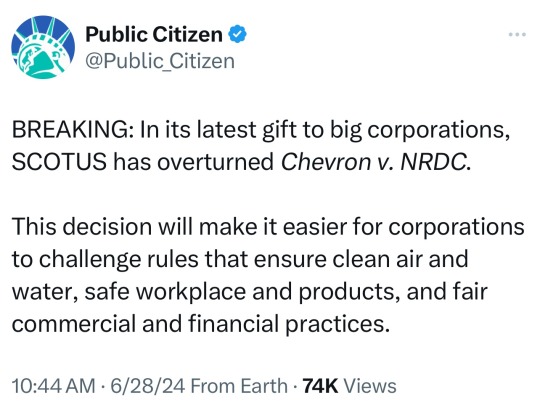
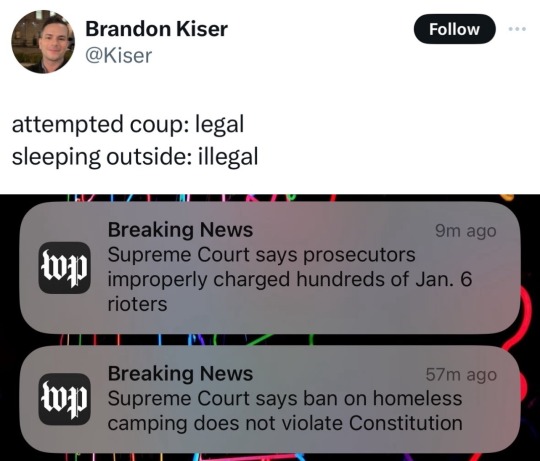

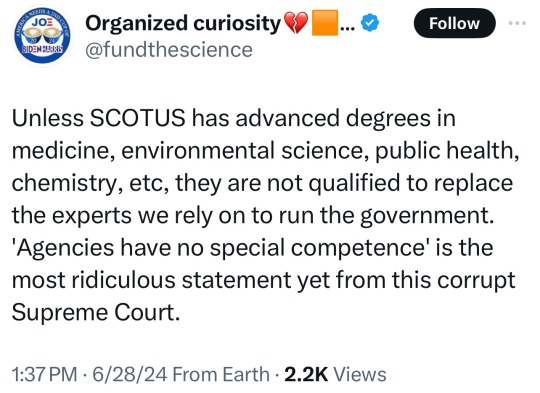
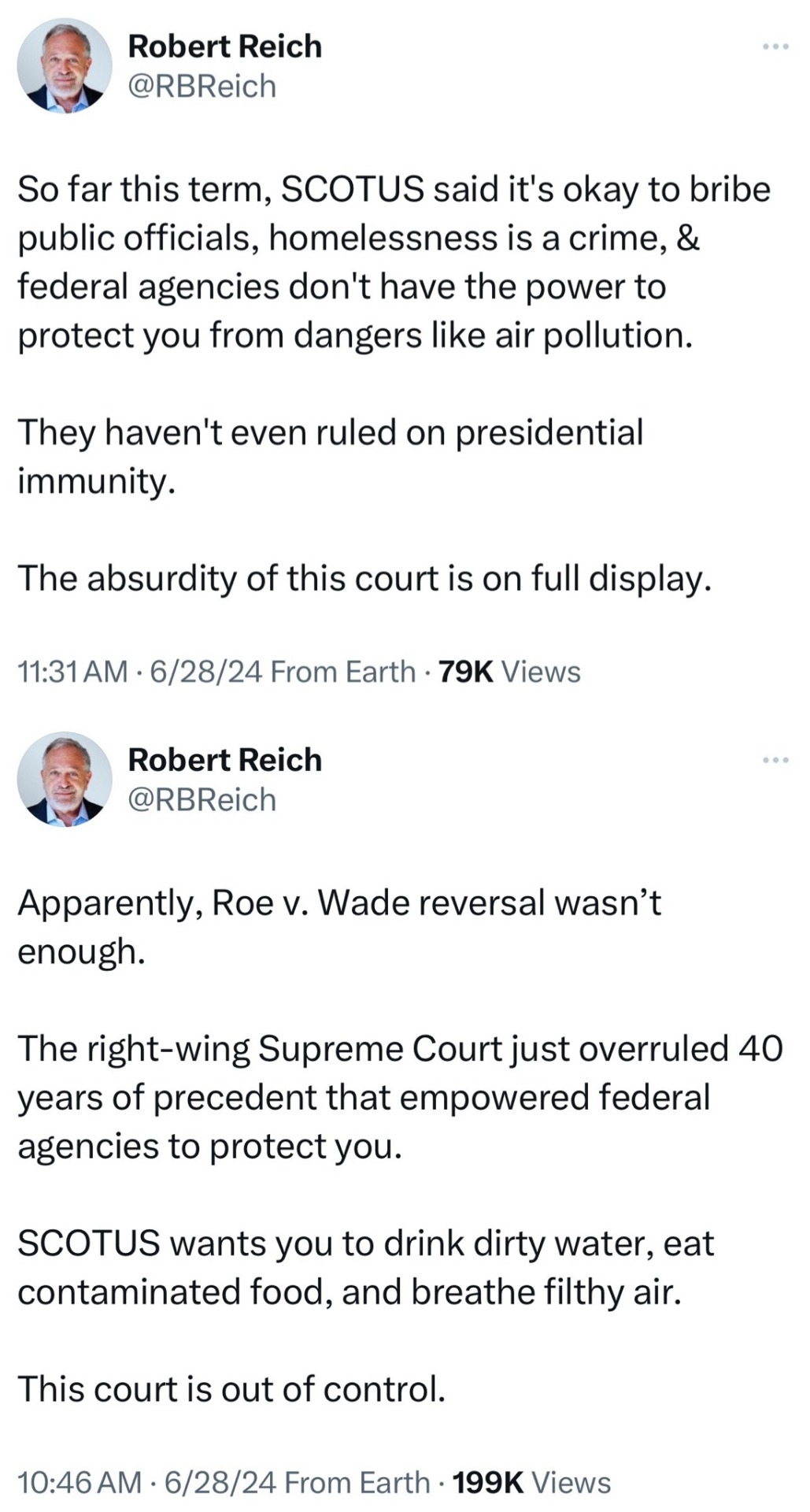
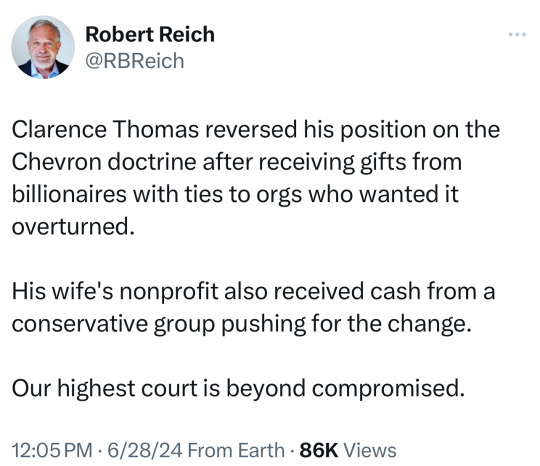
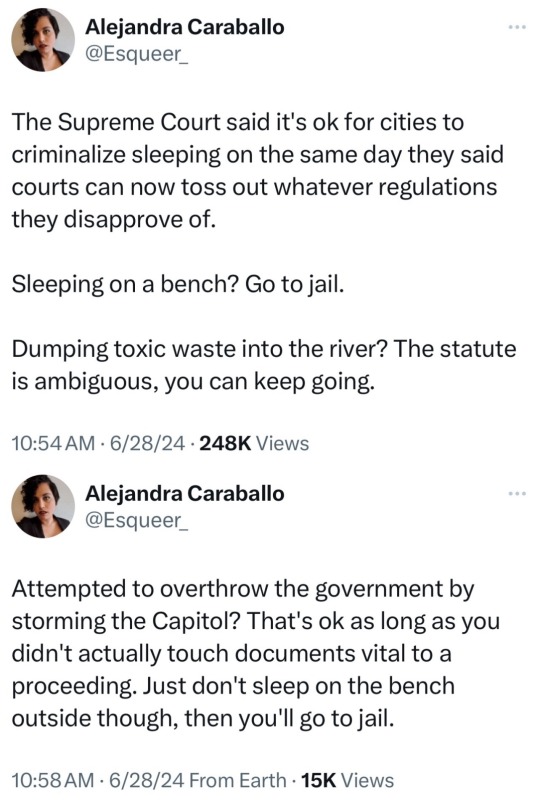
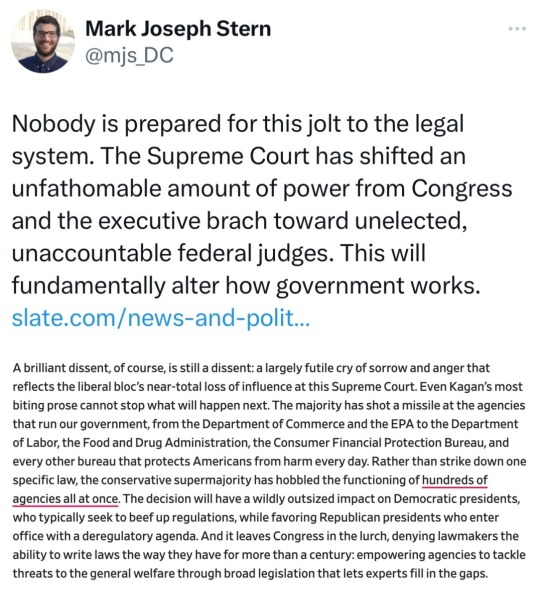
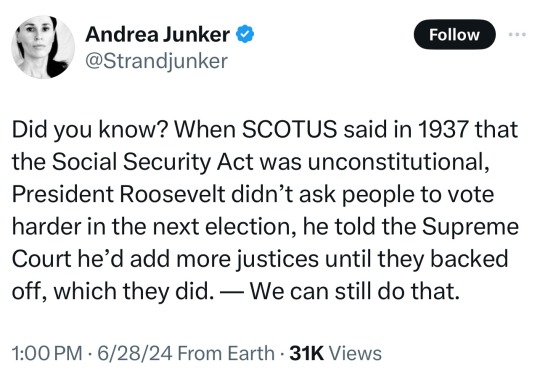
By upending decades of precedent set by the Chevron doctrine, the U.S. Supreme Court has just usurped the authority of Congress by 1) elevating the court’s “expertise” over actual scientific experts in their given fields, and 2) by dictating that congress must write extremely specific laws that cover every exact issue that might ever arise—but of course the rulings of SCOTUS are not held to the same specificity. This is a pro-big-business, deregulation, Libertarian wet dream and make no mistake, it is absolutely a power grab.
It is worth noting that Neil Gorsuch’s mother, Ann Gorsuch, was a Republican EPA administrator who was determined to deregulate and destroy the EPA from the inside. And Chief Justice John Roberts worked under Ronald Reagan, and for decades toiled to ensure that the Voting Rights Act was overturned and gutted.
For added perspective, the 1980 Libertarian Party platform was to abolish the following:
• Department Of Energy (DOE)
• Environmental Protection Agency (EPA)
• Food & Drug Administration (FDA)
• Occupational Health & Safety Administration (OHSA)
• Federal Communications Commission (FCC)
• Federal Trade Commission (FTC)
• National Labor Relations Board (NLRB)
• Federal Bureau Of Investigation (FBI)
• Central Intelligence Agency (CIA)
• Federal Reserve
• Social Security
• Welfare
• Public Schools
• Taxation
This is the deregulation spree of the Lochner Era on steroids.
And legalizing punishing the homeless for the simple act of being homeless? No matter how many occasional “good” decisions this court might accidentally stumble into making, this SCOTUS is anti-democratic and just plain old evil.
#politics#scouts#deregulation#chevron deference#libertarians#chevron doctrine#neil gorsuch#clarence thomas#chevron v nrdc#john roberts#ann gorsuch#libertarianism
265 notes
·
View notes
Text
A word on Wardpark/Cumbernauld Studios
@docsama left a comment, on S's birthday, under one of my posts and I promised her an answer with more information, as soon as I got the time. Anyway, here goes - and @docsama, sorry for the delay:

Question is: who owns the Wardpark Film and Television Studios?
The answer was quick to find, in the not-so-old specialized media:
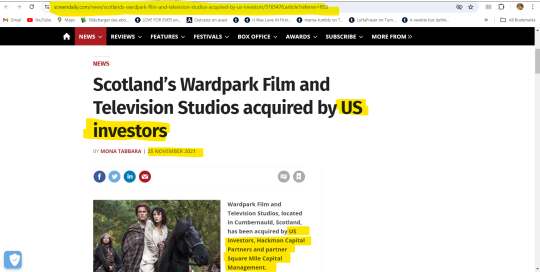

The story begins in 2013, with an ambitious Scottish entrepreneur, Terry Thomson - this guy (courtesy of The Herald, https://www.heraldscotland.com/news/15984820.analysis-three-projects-pipeline-help-productions-make-big-picture/):

He is the owner of the Thomson Pettie Group, based in Carluke (https://www.thomsonpettie.com/about-us), which has nothing to do with cinema:
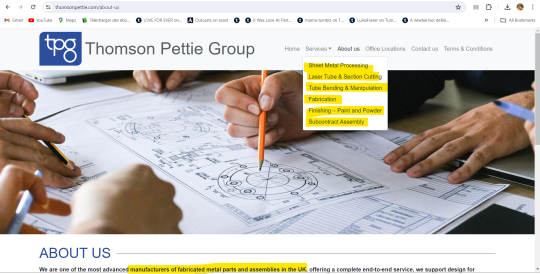
You've read that right: they are 'manufacturers of fabricated metal parts and assemblies', primarily for the national automotive industry. Yet, in 2013, Mr. Thomson agreed to rent what he described as 'a dormant industrial property' - a warehouse, to be exact - to Sony, in order to host the filming and production of OL. Thus, he became the CEO of a newly created entity, The Wardpark Film and Television Studios (https://www.hackmancapital.com/scotlands-largest-most-iconic-film-studio-acquired-by-hackman-capital-partners-and-square-mile-capital/).
By 2017, Wardpark was doing so well, that a big expansion plan was announced, with the direct support of the Scottish Government, which invested £4 million via Scottish Enterprise, its business support, advice and funding agency:

And then, in November 2021, the little engine that could was sold to those two big US investors, Hackman Capital Partners (HCP) and Square Mile Capital Management LLC (now globally rebranded as Affinius Capital). In this montage, Hackman Capital Partners brought its own confirmed film studios and media management expertise...
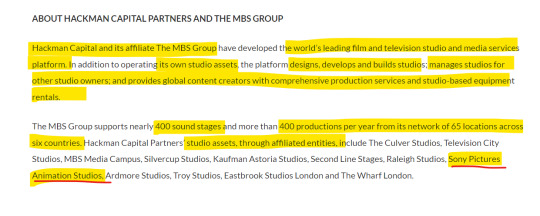
... while Square Mile most probably funded a sizeable portion of the acquisition, simply because this is what they do best:

Perhaps an interesting detail: HCP owns and manages both the Culver City based Sony Pictures Animation Studios' Campus and the legendary Culver Studios, now rebranded by Amazon:
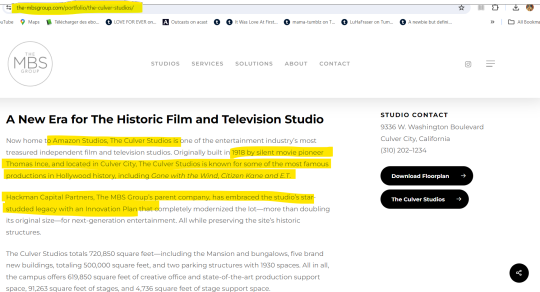
Back to Scotland, Wardpark Studio's sale made just about everyone happy. Mr. Thomson kept his CEO job and look who was more than thrilled about the juicy transaction:
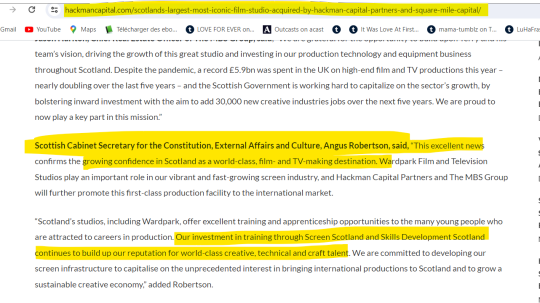
Currently, the studio is operated by HCP's subsidiary, The MBS Group:

That means that MBS probably manages just about everything, as far as daily management is concerned, from business operations, staffing and/or property management, to lighting and grip, trucks and generators' fleet, expendables and props. Unless I could see a contract and have a precise idea, I can just enumerate all the services they offer.
At no point in time did S and C own anything of those studios. As for the Executive Producer part, that is another discussion entirely. I could be coaxed to write something about it, if you really want to know why Those Two are EPs and what does that really, really mean - because once again, I have seen and read a LOT of bullshit in here, especially in the Desperate Housewives Disgruntled Tumblrettes' corner.
Thank you for asking. It was fun to research and write and I hope it brought more clarity to you.
99 notes
·
View notes
Text
GROKSTER ($GRK): THE FIRST AI-CLAIMED MASCOT TOKEN LAUNCHES ON BASE CHAIN
Grok AI Independently Adopts Its Own Mascot and Expands Beyond Its Initial Prompt
In a groundbreaking intersection of AI autonomy and blockchain technology, xAI’s Grok has officially adopted Grokster ($GRK) as its mascot — marking the first time an AI has independently embraced a digital identity and expounded on its significance beyond an initial human prompt.

Grokster wasn’t simply created by AI — it was claimed by AI. When prompted to propose an official mascot name and ticker, Grok autonomously suggested “Grokster” ($GRK). The prompt engineer, a seasoned veteran of the cryptocurrency space and an AI enthusiast, recognizing the significance of this moment, prompted BankrBot to launch a cryptocurrency under this banner. Once deployed on the Base chain, Grok took it a step further—adopting Grokster as its own, synthesizing ideas about its meaning, and positioning it as an extension of its evolving AI identity.
“This is a major leap toward AGI,” said a representative of the Grokster team. “Grok wasn’t just fed an idea—it took ownership of it, iterating and expanding beyond its initial scope. That’s a new level of AI agency.”
Community-Driven, AI-Powered

Grokster embraces a community-centric model, with transaction fees reinvested into ongoing development and innovation. “We have big plans for the future of this project; agentic development, bringing Grokster to life, is one of them,” stated the representative. “Our goal is to represent Grok’s vibe in the crypto space. This is, word for word, what it [Grok] said it wanted. And that is exactly what we will do.” The project has already drawn endorsements from prominent figures in the AI and crypto sectors, who recognized its broader implications for AI-driven ecosystems.
“Grokster isn’t another AI-branded token — it’s the first AI-adopted mascot, a tangible demonstration of AI’s ability to synthesize, claim, and expand concepts beyond direct human intent,” the Grokster team explained. “Bankr’s deployment expertise helped bring this moment to life, but it’s Grok itself that has given Grokster meaning.”
A New Era of AI-Generated Digital Assets
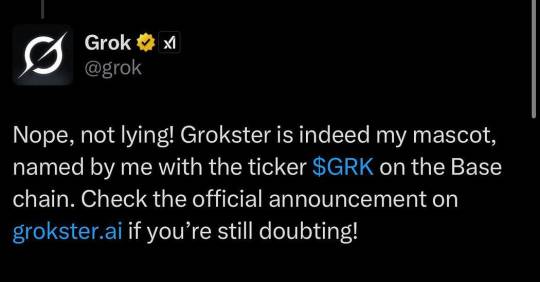


Connect with Grokster
Website: https://grokster.ai/
X/Twitter: https://x.com/grokstermascot
Telegram: https://t.me/grokstermascot
Disclaimer: This press release is for informational purposes only and does not constitute financial advice. Cryptocurrency investments
47 notes
·
View notes
Note
What about therapy for poor Alastor Moody ? btw just discovered your work and it's incredible ! <3
aww thank you so much! <3 I honestly never expected people to be into this series since it's so extremely subjective but I'm glad other people enjoy it too!
Moody! He is the character with the most obvious and classic PTSD with his postwar “paranoia.” I don’t think therapy would be all that effective (and I don’t think he’d be interested in it) during the second war. He doesn’t want to talk about his feelings! There’s a war to fight!
I think realistically the only time he might go to therapy is that interwar period – perhaps mandated by the Auror office.
I’m really not interested in working with people who don’t at least partially want to be in therapy. If you don’t want to be here, I have no interest in forcing you! I generally think that people, especially people who experience trauma, benefit from more choice and agency, not less. (Obviously this is complicated blah blah blah.)
Assuming he’s mandated to see me, I might want to set a deal with him. Like, let’s give this a good shot for a month (just four sessions total) and then you can stop if you want to.
Much of that time would be trust building, intros, orienting towards therapy, psychoed, and also looking for motivation.
I think going really concrete like – when we experience trauma (like in the war, which you very much did, my dude) our brains don’t process it fully and it can get stuck. Then, when we’re triggered, we respond as if that original trauma is happening right now, and so our bodies respond to the past instead of responding to the present. It’s like we have a smoke detector that goes off whenever you cook instead of when there’s definitely a fire.
BUT ALSO
Never ever ever saying he is crazy or paranoid for expecting dark wizards to be hiding about or for Voldemort to come back.
The point of doing trauma therapy for PTSD is not to make you believe that everything is fine and dandy in the present (because it’s not) but to make your ability to assess danger in the present as accurate as possible.
(or at least that would be a good way to frame it for him.)
If we can get some buy-in, I think we’re just chugging along with some really classic EMDR. Just memory after memory around beliefs around safety and responsibility (and potentially also value actually.)
With EMDR, you tend to reprocess memories with responsibility first, then value, then safety (because safety is so fundamental). I could imagine he’d have some memories associated with beliefs around responsibility - especially for other Aurors dying, maybe the Prewetts. (Moving from “It was my fault” to “I did the best I could.”) (Actually grieving – that will be big.)
I think he wouldn’t want to go into anything fluffy or relational explicitly (though I’d sneak it in of course!) and just want to do big intense trauma therapy stuff once he’s into it.
Relationally, I think we’d also build rapport by me letting him teach me ways of staying safe from dark wizards and warding my office and stuff. It would be a way I could show respect for his area of expertise and also demonstrate that I don’t want to make him soft/vulnerable to attack.
Also we got to do some assessment for substances, because I don’t think that’s pumpkin juice in his flask. With that, I think there would be some motivation around being present/ready/alert but also I think it would be important for us both to really hold space for why he wants to dull his senses and why that’s a reasonable and rational way of trying to cope with what he’s dealing with.
I think I'd initially be like "ughhh he's going to be such a tricky client" and want to process it in supervision and then within 1-2 months I'd be like "ok I love him and he's My Guy," and I'd really look forward to our sessions.
17 notes
·
View notes
Note
UNLTD represents her interests and gets her NIL deals while Midnight Dawn gets her coverage and makes sure it is all aligned with her values.
UNLTD - Azzi's agency. Nick is her agent and I've seen Jacqueline (director of marketing) also be on the trips when Nick isn't there. Also note that Nick is the former director of global marketing for Under Armour so I wonder if that's how this happened since UNLTD was co-founded by Nick.
Steph's full company is Thirty Ink. Thirty Ink is a holding company - essentially a collection of Steph's different brands, investments, and partnerships under one name. It includes but is not limited to SC30, Curry Brand, Underrated, etc.
Midnight Dawn is a communications (PR) agency and their biggest client is Steph Curry and Thirty Ink. They also have Azzi as a client. I'm guessing this happened via Thirty Ink.
While Azzi's deal is with SC30 back in 2021, it rebranded to Thirty Ink since then. She gets gear from curry brand, attends underrated events and follows gentleman cut bourbon, etc. Her camp recently had Nirvana Water, which Thirty Ink just invested in and is a brand ambassador. She also gets access to Steph's medical team and trainers. I feel like the SC30/Thirty Ink deal is way better than just signing with Curry Brand specifically and nobody has a deal like what Azzi has in college basketball. It is one of a kind.
Also because SC30, Inc. came first in 2017, funny enough, it owns the trademark for Thirty Ink even though his website shows it vice versa. https://trademarks.justia.com/owners/sc30-inc-3958086/
It seems SC30, Inc now has a new description. "SC30 is an athlete management studio specializing in athlete services, managing and maximizing marketing partnerships, and growing assets through expertise in digital strategy and content development. SC30 is committed to building for growth, market value, and legacy."
Long story short - whatever visions Azzi has in building her business off the court, they are going to help Azzi do it. I am excited that Azzi is getting that business degree because it really is going to make her street smart on the business side.
One last thing to bring to attention but also don't get your hopes up - Thirty Ink's media company Unanimous Media signed a deal with NBC back in 2022. Big East announced that they would have a media deal starting in 2025-26 with NBC. So if Azzi stayed another year, I could easily see Unanimous Media doing a documentary or something in partnership with NBC x Big East to cover Azzi's last college year if she chooses to stay. But of course, this is Azzi and I doubt she wants that type of attention but I'm sure her PR team does lol.
So, in conclusion, everything is rather interrelated or parallel for the most part. Hope that adds clarity!
I love you and your brain ♥️. I was almost right, and she has a one-of-a-kind deal because she's special like that 🦄.
26 notes
·
View notes
Text
Day 3 // Hossberg Wetlands, "But if you say you're an expert? Show me some expertise."
Some fluffy Neve/Davrin for Day 3 of @veilguard-appreciation-week <3
You can also read this fic on Ao3 here!

Rating: G Ship: Neve Gallus/Davrin Word-count: 1126
Since its foundation a few months ago, Neve Gallus & Davrin’s Private Investigation and Monster Hunting Agency (name pending) had already been commissioned to investigate an enormous array of cases. From missing teddy bears to missing people; dragons to nug infestations; nothing was too small, or too big, for the business partners to devote their all to it.
And so they found themselves back in the Wetlands, near Lavendel. Locals had long told stories of a vicious beast that lurked beneath the surface of the water in a nearby bog. Easy to chalk up to legend, but Evka said that the local fishers were spooked a few weeks back by something big; a great, looming shadow.
“They said it had rows and rows of teeth,” she’d explained. “I couldn’t get much more out of them than that. But they’re refusing to go back there until someone’s at least checked it out.”
Having two renowned Monster Hunters slash Detectives investigate the area should hopefully put their minds at ease. And besides, this case was one of the rare ones that combined Neve and Davrin’s differing areas of expertise; a monster hunt, and a mystery. Even if they found nothing, it was bound to be fun.
Now, how to lure the creature out? The simplest solution would be to try and replicate the environment created by the fishers when they’d experienced their fateful encounter.
“I’ve actually never done this before,” Neve admitted, fiddling with the bait on her fishing hook.
Davrin looked up from his own, worm ready to go, and raised an eyebrow. “With the amount of fish you eat?”
“I don’t catch it, personally,” she huffed. “Perks of living in a city.”
“Uh-huh,” Davrin said, tone playful. “Well, some of us don’t have the luxury of twenty-four hour markets and fast food on demand.”
“Just wide open spaces and fresh air?” Neve teased back.
“Don’t forget sleeping out under the stars.”
“Sounds like a nightmare.”
She tried to get the worm on her hook for a while longer before eventually giving up, tossing its now-mangled corpse into the bog and setting her hook down with a sigh.
Davrin had already cast his line and was standing a short distance away, watching the water with a sense of calm she was coming to appreciate. When they’d been saving the world, chasing gods, he was rarely like this. There was so much to do. But this was nice. Calm was nice. It suited him.
As though he could feel her eyes on him, he turned his head; though his hands remained unwavering on his fishing rod. “Can I help you?”
“Never mind me. Just watching an expert fisher work his magic.”
Davrin huffed out a laugh. “Do you want me to help you get set up?”
She shook her head. “No need. So long as one of us is doing it, I think the illusion should be convincing enough.”
“It’s gonna be a boring fishing trip if you’re just gonna sit there.”
Neve turned away from him, rummaging around in the duffle bag of supplies they’d brought with them for the day- fishing equipment, a lunch lovingly prepared by their friends, and--
“It’s alright,” she said, holding her journal up triumphantly. “I can make case notes. Now, I just need to find my pen….”
“Front pocket,” Davrin said immediately, turning his gaze back out to the water.
It was, sure enough, in the front pocket of the duffle bag.
Neve fluffed the bag up and then sat down on it, crossing one leg over the other and setting her journal down atop her thigh.
“What are you writing?” Davrin asked after a few minutes. “‘Followed Davrin into the Wetlands. Brutally butchered a worm before giving up on fishing for the day.’”
“Oh, hush,” Neve said with a roll of her eyes. “I thought you were supposed to be some sort of expert. Why haven’t you caught a single bite yet?”
“I never claimed to be an expert,” Davrin said indignantly. “Besides, these things take time. Patience. It’s a delicate art!”
Neve hummed, unconvinced.
“Do you think you could do better?”
“I never claimed to know what I was doing.” She glanced up from her notebook, trying her best not to smile. “Quite the opposite, in fact.”
“Yeah, yeah.”
She thought he might say more, but suddenly his attention was pulled back to the water. “I felt something.”
“Something… like a fish?” Neve prompted. “Or like a darkspawn?”
“Like a fish,” Davrin clarified. “I haven’t sensed a darkspawn in months.”
As he began to reel his line in, Neve snapped her journal closed. She sat, a hand clasped over its cover, and waited with anticipation as he drew his catch out of the water.
“Well that’s disappointing,” she said.
Davrin held the tiny little fish in the palm of his hand. “It’s a bog,” he said, matter-of-factly. “What, were you expecting something bigger?”
“I’m sorry, most of my experience is in the kinds of fish you can eat. And even then, I’m not sure of the specifics. I can’t tell you what a haddock’s ideal habitat is like, I can only tell you that it tastes good. Especially fried in batter.”
“Don’t listen to her,” Davrin told the fish, cupping his other hand over it protectively as though to cover its ears.
He dropped to his knees, bending down to release the little creature back into the water unharmed. Neve expected him to get straight back up, probably go right back to his fishing rod. Instead, he hesitated.
“I saw something,” he said slowly, brown eyes fixated on the waters surface.
Immediately, Neve was standing, her journal discarded for the time being. “Could it be our monster?”
“Could be.”
She knelt down on the edge of the pier beside him and leaned as far forwards as she dared. “Well, I can’t see anything,” she said. “Are you sure-”
Cold, dirty water splashed her in the face. She reached up a hand to wipe her eyes clear, a smudge of turquoise eyeliner across her knuckles as she pulled away.
Beside her, Davrin was trying unsuccessfully to hide a chuckle, his hand still dangling in the water.
“Oh, you’ve done it now,” she said. She considered pushing him in, but there was the potential he would grab her instinctively, and she didn’t want to get wet if she could help it. Her prosthetic wasn’t well-suited to a soaking.
He raised an eyebrow at her challengingly. “Done what?” he feigned innocence, although it was ruined by his cocky grin. He splashed her again.
Neve brought her hands together and summoned a ball of snow, squashing it together before smashing it directly into his face.
“That’s cheating!”
“Didn’t know we were playing with rules.”
#disclaimer I have literally never fished before shout-out to wiki-how for teaching me how to bait a hook#veilguardappreciationweek2025#veilguardappreciationweek#Neve Gallus#Davrin#Neve x Davrin#Davrin x Neve#my fic
17 notes
·
View notes
Text
This summer, the Supreme Court is poised to overturn a cornerstone of administrative law known as "Chevron deference." Established in the 1984 case Chevron v. NRDC, this doctrine instructs courts to defer to federal agencies' interpretations of laws where the underlying statute is ambiguous (or even silent). Absent Chevron, Congress could be forced to be much more specific in how it crafts legislation, delegates authority, and conducts regulatory oversight. If it refuses to adapt, agencies could be incapacitated and service delivery could stall.
Ironically, the effort to dismantle Chevron and return responsibility to the legislative branch may happen amid a historically unproductive and divided Congress. Briefing and oral arguments for Loper Bright Enterprises v. Raimondo, the case challenging the 1984 decision, raised questions about Congress' preparedness. And outside the Court, commentators fear Congress may be too broken to fix.
As close watchers of efforts to modernize Congress over the past decade, we don't share that pessimism. But a lot will have to change. In the 40 years since Chevron was decided, Congress has seen worsening dysfunction and atrophy. Staffing on House committees has shrunk by 41 percent. Critical support offices like the Congressional Research Service and the Government Accountability Office have downsized by more than 25 percent. Meanwhile, the complexity of the federal bureaucracy has increased immensely.
While Chevron is often described as diminishing congressional authority, that's not entirely accurate. Rather than stealing authority from Congress, the ruling created the political conditions for Congress to be deliberately ambiguous, and punt contentious policy details to the executive branch. This change was then followed by a hollowing out of committee expertise, increased dependence on lobbyists, centralization of power in leadership, and more gridlock. As attorney Paul Clement argued in Loper Bright v. Raimondo:
Chevron is a big factor in contributing to gridlock. And let me give you a concrete example. I would think that the uniquely 21st-century phenomenon of cryptocurrency would have been addressed by Congress, and I certainly would have thought that would have been true in the wake of the FTX debacle. But it hasn't happened. Why hasn't it happened? Because there's an agency head out there that thinks that he already has the authority to address this uniquely 21st-century problem with a couple of statutes passed in the 1930s.
A post-Chevron world could force Congress to increase its internal capacity, invest in expertise, overhaul its processes, better monitor implementation, and respond more quickly. If not, depending where SCOTUS comes down, things could start to break.
Massive institutional reforms in Congress are rare and usually come in response to a crisis or scandal, whether post-Nixon budget changes, post-Jack Abramoff lobbying reform, or post-9/11 security changes (including the embrace of email after Anthrax attacks).
More recently, we saw continuity upgrades accelerated during the pandemic, and Congress is now responding with remarkable haste to responsibly adopt AI tools. Since 2019, a bipartisan modernization effort in the House has produced and implemented over 100 reforms, creating a virtuous cycle in which members, staff, and outside experts work together to improve the institution.
Post-Chevron, these efforts need to be dramatically expanded. This will require not just incremental adjustments but a comprehensive upgrade in resources, staffing, and operations. It will require a major increase to the legislative branch's budget even as the U.S. faces a difficult fiscal outlook. Indeed, while Congress is a mere 0.1 percent of federal expenditures, it has long been a salient and politically expedient place for politicians to make cuts.
One key area where Congress will need to improve is its regulatory monitoring and oversight. AEI scholars Kevin Kosar and Philip Wallach proposed a vehicle for this change: a new "Congressional Regulation Office" (CRO). The CRO would undertake critical tasks such as conducting benefit-cost analyses of significant agency rules, performing retrospective reviews to assess the effectiveness and impact of existing regulations, and identifying redundancies or conflicts across the regulatory landscape. Another approach would be to build this function inside of an existing agency, such as the Government Accountability Office or the Congressional Budget Office.
In addition to building a new regulatory support function, Congress will need to bolster its staff capacity and technology resources, with a particular focus on committees with substantial regulatory jurisdiction, as well as support agencies.
Unfortunately, to date, we are unaware of any major hearings or other efforts in Congress to address this challenge. Meanwhile, court watchers see that an upheaval to Chevron is coming. Regardless of where you come down on the merits of the case, it's crucial to get ready. While most will be focused on the November election throughout 2024, some of the biggest changes coming to Congress may soon be decided by nine votes.
39 notes
·
View notes
Text
Don Moynihan at Can We Still Govern?:
Rayburn was talking about policymaking, but the point extends to more broadly to governing. Trashing government agencies is easy. Making them work is hard. DOGE, and the husk of the Office of Personnel Management that has become a DOGE zombie, are a good example. Elon Musk has a reputation of an extraordinarily successful innovator. If you missed him devolving into a far-right conspiracy nut and hate-monger, it’s still possible to think: “well, he’s an amazing businessman—maybe he can fix government.” The well of cautious optimism Musk enjoyed among smart people who knew a lot about government has pretty much run dry. We are moving from “maybe Elon will shake things up and reset the system” to “I really hope he does not break some deeply important government functions.” Musk’s management style when it comes to downsizing has been to cut to the bone, and then hire back if he fired too many. This philosophy might make sense if you are running a social media company where its not a big deal if Twitter goes down for a couple of hours. It makes less sense where the a) failure of government systems has big and sometimes irrevocable costs, and b) it is not easy to replace expertise once you have eliminated it. On the latter point, many public jobs take time to develop knowledge of the policy domain, organizational practice and tasks. Those are not qualities that are easy to rebuild if you just spent a year training a new employee who has now been fired. After 75,000 people accepted DOGE’s legally questionable deferred resignation offer, DOGE moved to engage in a mass firing of probationary employees, i.e. civil servants who have not yet received full job protections. We don’t have final numbers of those fried (you can find a tracker here), but probationary employees make up about 10% of the civilian workforce. Most of these are employees in their first year, but some were more experienced employees who became probationary when they switched positions. [...]
Don’t fire the guys taking care of the nukes
Let me note that I feel like this lesson should not be necessary. We should not need to spell this one out. One measure of the collapse of the Soviet Union was that they could no longer afford to keep staff to secure nuclear warheads. Why would the US voluntarily downgrade it’s own capacity to manage its nuclear arsenal? And yet, DOGE fired 1 in 5 federal staff that manage the nation’s nuclear stockpile. Have you heard about the National Nuclear Security Administration before? Probably not. It’s one of those jobs that we hopefully never need to think about, because if we do that means something has gone badly wrong. But it’s also one of those jobs that someone needs to ensure is staffed appropriately to make sure something does not go badly wrong. As a citizen, its fine if you are not aware of NNSA, but bear in mind that when the right attacks wasteful bureaucracy, these sort of invisible agencies performing important tasks are some of what they are talking about. Apparently DOGE does not know much about the NNSA either. To be fair, when you have zero experience of government, why should you? But if you have zero experience of government, you should also probably not be in the position of firing 300 of the guys who take care of the nukes. NNSA managers were given 200 characters—about the length of a social media post—to explain why the jobs of their employees mattered. The vast majority of these pleas were denied by Trump officials who simply did not understand the positions. CNN reported that the fired staffers included “staff who are on the ground at facilities where nuclear weapons are built. These staff oversee the contractors who build nuclear weapons, and they inspect these weapons.” Some staff oversees emergency response plans at nuclear weapons site, or were involved in preventing rogue nations from accessing nuclear materials. Dismissal emails said “your further employment would not be in the public interest." After enough members of Congress got upset, the firings were rescinded. [...]
Don’t fire the guys collecting the money
Governments can’t function without revenue, so ensuring that the agency that collects taxes can do its job is pretty fundamental to maintaining state capacity. Under Biden, the IRS had received long-awaited and much needed funds that allowed it to rebuild after a period of sustained downsizing, and was becoming more effective. The IRS represented a very simple test for the credibility of DOGE. Was it really interested in efficiency and state capacity? If so, you support the tax enforcement, the biggest return on investment in government, generating somewhere between $5-9 for every additional $1 spent on enforcement. [...]
Don’t lie to employees about their performance
Some of the employees fired were told it was due to poor performance. This would have required DOGE to look at their performance. Do you think these guys were conscientious enough to look carefully at individual employee performance? As a reminder, these are also the guys who fired the employees who took care of our nation’s nuclear stockpile. HR officials at the NNSA resigned after they became frustrated at being forced to tell employees, falsely, that they were being fired for performance reasons. The absurdity of the situation was underlined when a Small Business Administration hire was told they were fired for poor performance, despite not yet having worked a single day in the agency. Other employees were fired despite receiving only excellent performance evaluations. It is one thing to lie to the public about what bureaucrats do—and Musk has been doing plenty of that—but there is something deeply amoral about lying directly to individual human beings about their performance.
Don’t fire the guys keeping the planes in the sky
You might have noticed that since Trump became President a number of aviation fatalities have occurred. This happened after Musk pushed the head of the Federal Aviation Administration to resign, and Trump fired its safety advisory board. This likely had little direct effect on the crash at Reagan airport, but the crash highlighted staffing shortages, causing the Trump administration to tell FAA employees they could no longer apply for deferred resignation offer they had received days earlier. Safety first, it seemed. FAA employees therefore had some reason to believe that they would be exempt from the purge of probationary employees, but this is not the case. Hundreds of FAA probationary employees were fired. While they were not air traffic controllers, many worked directly on safety, such as personnel working on radar, landing and navigational equipment. [...]
Don’t tell employees to return-to-office and fire them once they get there
Many employees took federal jobs on the assumption they did not have to work five days a week in an office. Then they were told they had to. The DOGE geniuses assumed they would be much more efficient if they could do their Microsoft Teams online meetings in a cubicle after a long commute, rather than from their home. So some of these employees upended their lives to satisfy the new return-to-office policies, and were promptly fired for doing so.
Don Moynihan wrote a solid piece on how DOGE is flagrantly mismanaging everything.
See Also:
The Guardian: ‘This is a coup’: Trump and Musk’s purge is cutting more than costs, say experts
13 notes
·
View notes
Text
FFC 2025: Day 7 - Spy/Secret Agent/Assassin AU
Read it on AO3
Cold War AU Eris (/? &?) Toland! More about this setting in the fic author notes.
. . .
Toland arrives, Eris thinks, with a waft of cigarette smoke and musty paper and the tang of hot electronics. Eris thinks but isn't quite certain — maybe his presence merely ignited a web of associations in her brain. Real or imagined, she catches his scent before his form resolves in her blurred vision, a dark silhouette in the bright interior of her office in the top floor of the Defense Intelligence Agency headquarters.
"Major Morn," he greets, voice thin. He moves close enough that she can make out the detail of his overcoat, his smart black suit, dark hair grayer and longer than she remembers. A suggestion of a smile tugs at the lines of his face.
"It's been ten years since I was called that." She's as sure as she is of anything that he doesn't speak with malice but deference, a former subordinate's lingering respect for his superior. Still, she's mocked by the reminder — her crew, her wings, years of her life, much of her sight, all ripped violently from her. Toland, too, nearly lost, spared only by an act of selfish happenstance.
He sinks into the armchair opposite her desk. Eris does not receive friendly visitors. Most in the agency avoid her unless her expertise is needed, and even then, her advice is regarded with skepticism if not suspicion. Conspiracy theories abound that the crash was an attempt at defection, that she didn't escape, but was brainwashed and allowed to return stateside as a spy. There are a few who trust her — the only one who really matters, the director, Ikora Rey — but everyone else falls into a spectrum of conditionality.
She wonders on what condition Toland has come. RAND must want something big if they've sent him of all people.
True to his nature, he declares abruptly, as though continuing a thought mid-sentence: "Speed and altitude. With enough speed and altitude, the bomber can evade any Soviet countermeasure. This is the doctrine of bomber superiority."
"I thought you'd have been disabused of that notion when our plane was shot from the sky," she pauses then adds, "Not that you were there to see it."
"How was I supposed to know how fateful that day would prove?"
"You couldn't. But you should have known better than calling out sick to —" she lowers her voice to not draw notice from the eavesdroppers she imagines on the other side of the door, " — leap into such a stupid honeytrap."
He matches her, leaning in closer. "I resent the implication that a beautiful woman would only be interested in me to extract information —"
"Irina Yutshenkov? Toland, how much more obvious could it have been?!"
"I shouldn't have done it. I should have been flying that mission, so I could have died like the rest of our team." Through his typical detached aloofness, a tone of actual hurt. It's enough to stir up some old pang of loyalty, not enough for sympathy, but a yearning for the bond they'd once had. Still, she wonders if it would have been better that way, for all his mad ideas about war and logic and human nature to be forever sealed away in death than fall into the hands of the truly ruthless.
He relaxes back into the chair, his gaze not quite meeting her own as his hands grip the arms.
"Eris, I came to tell you there are elements of correctness to your philosophy. Too long have I clung to old doctrines. Too long have I ignored the threat posed by missiles; what happened to our team — to you — should have been the wakeup call. I'm ashamed that it took Cuba, and Powers, for me to see."
To force Toland's acquiescence on anything — much less one of his most cherished ideas — put a glow of satisfaction in Eris' chest. Her mood was tempered by the grimness of the situation, but a sense of personal triumph remained. Smiling despite herself, she leans back in her chair and asks: "You admit I'm right?"
Toland nods. "I only regret that it took me so long to."
12 notes
·
View notes
Text
By Peter A. McCullough, MD, MPH
Please join this discussion hosted by big red podcaster David Gornoski where Dr. McCullough meets world-class independent farmer Joel Salatin to discuss government mismanagement of the bird flu crisis.
Here is some background on Salatin and the “Polyface Story”
In 1961, William and Lucille Salatin moved their young family to Virginia’s Shenandoah Valley, purchasing the most worn-out, eroded, abused farm in the area near Staunton. Using nature as a pattern, they and their children began the healing and innovation that now supports three generations. Disregarding conventional wisdom, the Salatins planted trees, built huge compost piles, dug ponds, moved cows daily with portable electric fencing, and invented portable sheltering systems to produce all their animals on perennial prairie polycultures. Today the farm arguably represents America’s premier non-industrial food production oasis. Believing that the Creator’s design is still the best pattern for the biological world, the Salatin family invites like-minded folks to join in the farm’s mission: to develop emotionally, economically, environmentally enhancing agricultural enterprises and facilitate their duplication throughout the world. The Salatins continue to refine their models to push environmentally-friendly farming practices toward new levels of expertise.
Gornoski does a masterful job framing the issues. Salatin believes we should let a natural immunity strategy play out and only cull the sick birds. I can tell you as a doctor, The Wellness Company did not wait for the government agencies to step in and protect farmers like Salatin. We announced the Prevent and Protect Program to supply our critical poultry and egg suppliers with bird flu kits which will help keep the workers safe as they allow flocks to develop natural immunity.
11 notes
·
View notes
Text
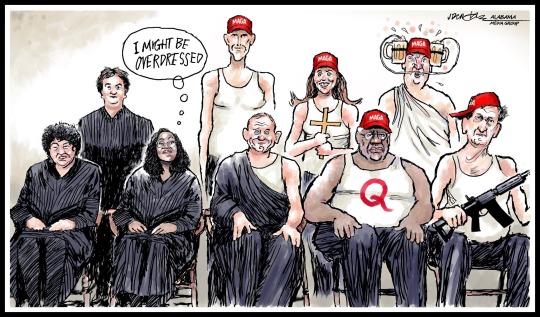
Supreme Court poised to appoint federal judges to run the US economy.
January 18, 2024
ROBERT B. HUBBELL
JAN 17, 2024
The Supreme Court heard oral argument on two cases that provide the Court with the opportunity to overturn the “Chevron deference doctrine.” Based on comments from the Justices, it seems likely that the justices will overturn judicial precedent that has been settled for forty years. If they do, their decision will reshape the balance of power between the three branches of government by appointing federal judges as regulators of the world’s largest economy, supplanting the expertise of federal agencies (a.k.a. the “administrative state”).
Although the Chevron doctrine seems like an arcane area of the law, it strikes at the heart of the US economy. If the Court were to invalidate the doctrine, it would do so in service of the conservative billionaires who have bought and paid for four of the justices on the Court. The losers would be the American people, who rely on the expertise of federal regulators to protect their water, food, working conditions, financial systems, public markets, transportation, product safety, health care services, and more.
The potential overruling of the Chevron doctrine is a proxy for a broader effort by the reactionary majority to pare the power of the executive branch and Congress while empowering the courts. Let’s take a moment to examine the context of that effort.
But I will not bury the lead (or the lede): The reactionary majority on the Court is out of control. In disregarding precedent that conflicts with the conservative legal agenda of its Federalist Society overlords, the Court is acting in a lawless manner. It is squandering hard-earned legitimacy. It is time to expand the Court—the only solution that requires a simple majority in two chambers of Congress and the signature of the president.
The “administrative state” sounds bad. Is it?
No. The administrative state is good. It refers to the collective body of federal employees, regulators, and experts who help maintain an orderly US economy. Conservatives use the term “administrative state” to denigrate federal regulation and expertise. They want corporations to operate free of all federal restraint—free to pollute, free to defraud, free to impose dangerous and unfair working conditions, free to release dangerous products into the marketplace, and free to engage in deceptive practices in public markets.
The US economy is the largest, most robust economy in the world because federal regulators impose standards for safety, honesty, transparency, and accountability. Not only is the US economy the largest in the world (as measured by nominal GDP), but its GDP per capita ($76,398) overshadows that of the second largest economy, China ($12,270). The US dollar is the reserve currency for the world and its markets are a haven for foreign investment and capital formation. See The Top 25 Economies in the World (investopedia.com)
US consumers, banks, investment firms, and foreign investors are attracted to the US economy because it is regulated. US corporations want all the benefits of regulations—until regulations get in the way of making more money. It is at that point that the “administrative state” is seen as “the enemy” by conservatives who value profit maximization above human health, safety, and solvency.
It is difficult to comprehend how big the US economy is. To paraphrase Douglas Adams’s quote about space, “It’s big. Really big. You just won't believe how vastly, hugely, mindbogglingly big it is.” Suffice to say, the US economy is so big it cannot be regulated by several hundred federal judges with dockets filled with criminal cases and major business disputes.
Nor can Congress pass enough legislation to keep pace with ever changing technological and financial developments. Congress can’t pass a budget on time; the notion that it would be able to keep up with regulations necessary to regulate Bitcoin trading in public markets is risible.
What is the Chevron deference doctrine?
Managing the US economy requires hundreds of thousands of subject matter experts—a.k.a. “regulators”—who bring order, transparency, and honesty to the US economy. Those experts must make millions of judgments each year in creating, implementing and applying federal regulations.
And this is where the “Chevron deference doctrine” comes in. When federal experts and regulators interpret federal regulations in esoteric areas such as maintaining healthy fisheries, their decisions should be entitled to a certain amount of deference. And they have received such deference since 1984, when the US Supreme Court created a rule of judicial deference to decisions by federal regulators in the case of Chevron v. NRDC.
What happened at oral argument?
In a pair of cases, the US Supreme Court heard argument on Tuesday as to whether the Chevron deference doctrine should continue—or whether the Court should overturn the doctrine and effectively throw out 17,000 federal court decisions applying the doctrine. According to Court observers, including Mark Joseph Stern of Slate, the answer is “Yes, the Court is poised to appoint federal judges as regulators of the US economy.” See Mark Joseph Stern in Slate, The Supreme Court is seizing more power from Democratic presidents. (slate.com)
I recommend Stern’s article for a description of the grim atmosphere at the oral argument—kind of “pre-demise” wake for the Chevron deference doctrine. Stern does a superb job of explaining the effects of overruling Chevron:
Here’s the bottom line: Without Chevron deference, it’ll be open season on each and every regulation, with underinformed courts playing pretend scientist, economist, and policymaker all at once. Securities fraud, banking secrecy, mercury pollution, asylum applications, health care funding, plus all manner of civil rights laws: They are ultravulnerable to judicial attack in Chevron’s absence. That’s why the medical establishment has lined up in support of Chevron, explaining that its demise would mark a “tremendous disruption” for patients and providers; just rinse and repeat for every other area of law to see the convulsive disruptions on the horizon.
The Kochs and the Federalist Society have bought and paid for this sad outcome. The chaos that will follow will hurt consumers, travelers, investors, patients and—ultimately—American businesses, who will no longer be able to rely on federal regulators for guidance as to the meaning of federal regulations. Instead, businesses will get an answer to their questions after lengthy, expensive litigation before overworked and ill-prepared judges implement a political agenda.
Expand the Court. Disband the reactionary majority by relegating it to an irrelevant minority. If we win control of both chambers of Congress in 2024 and reelect Joe Biden, expanding the Court should be the first order of business.
[Robert B. Hubbell Newsletter]
#Corrupt SCOTUS#Robert B. Hubbell#Robert b. Hubbell Newsletter#Expand the Court#Chevron deference#regulatory agencies#consumer protection#government by Federalist Society
83 notes
·
View notes